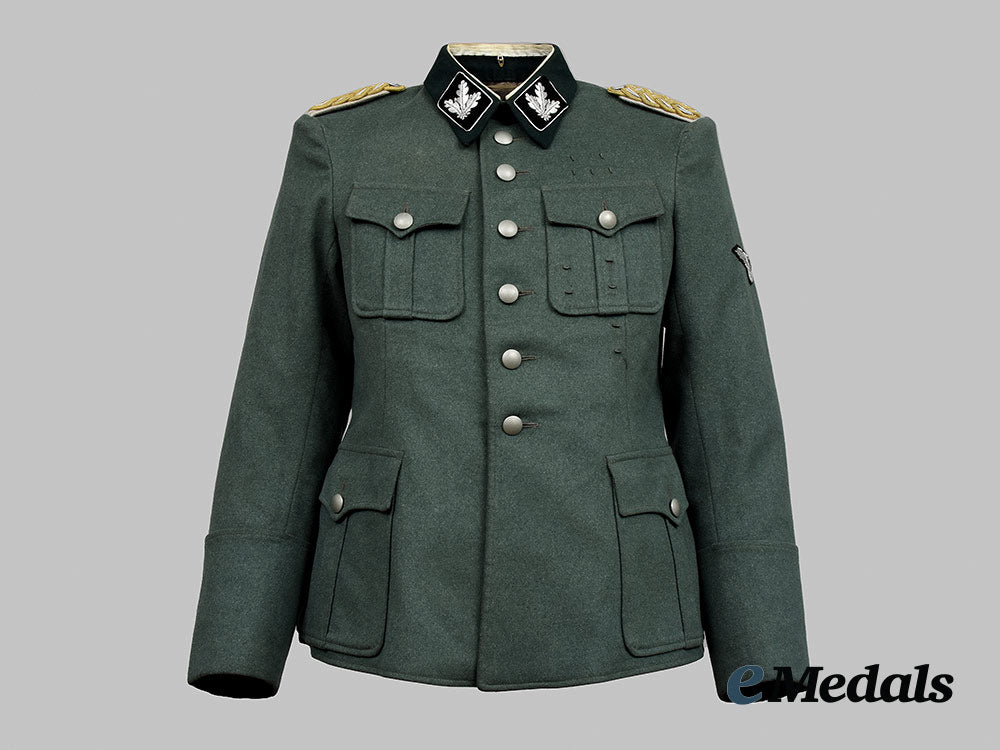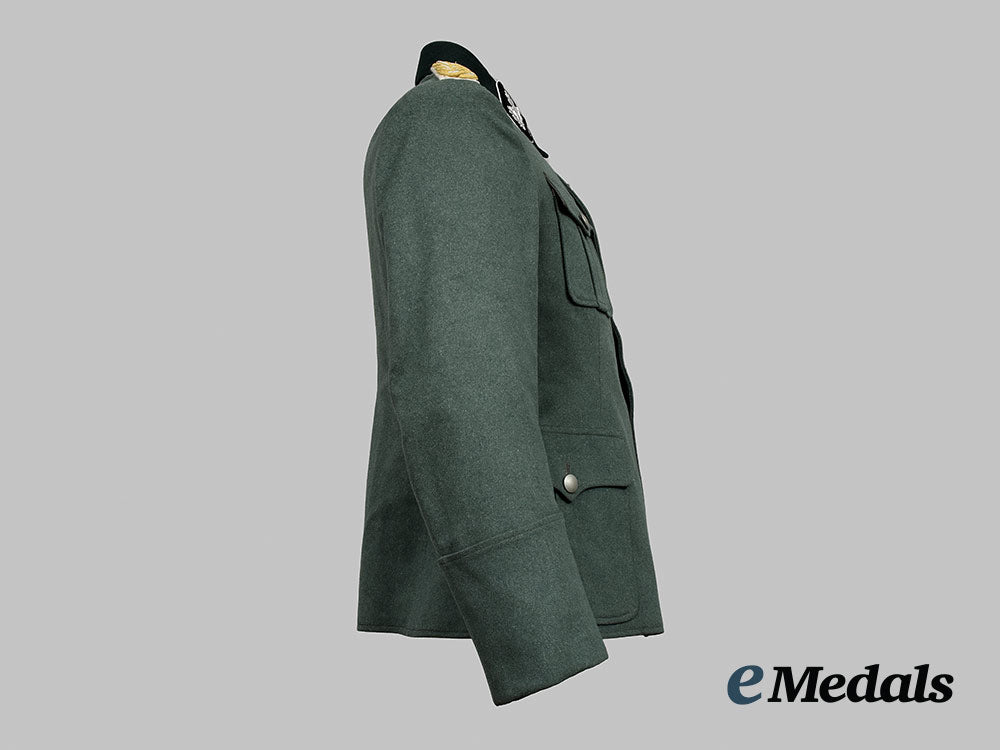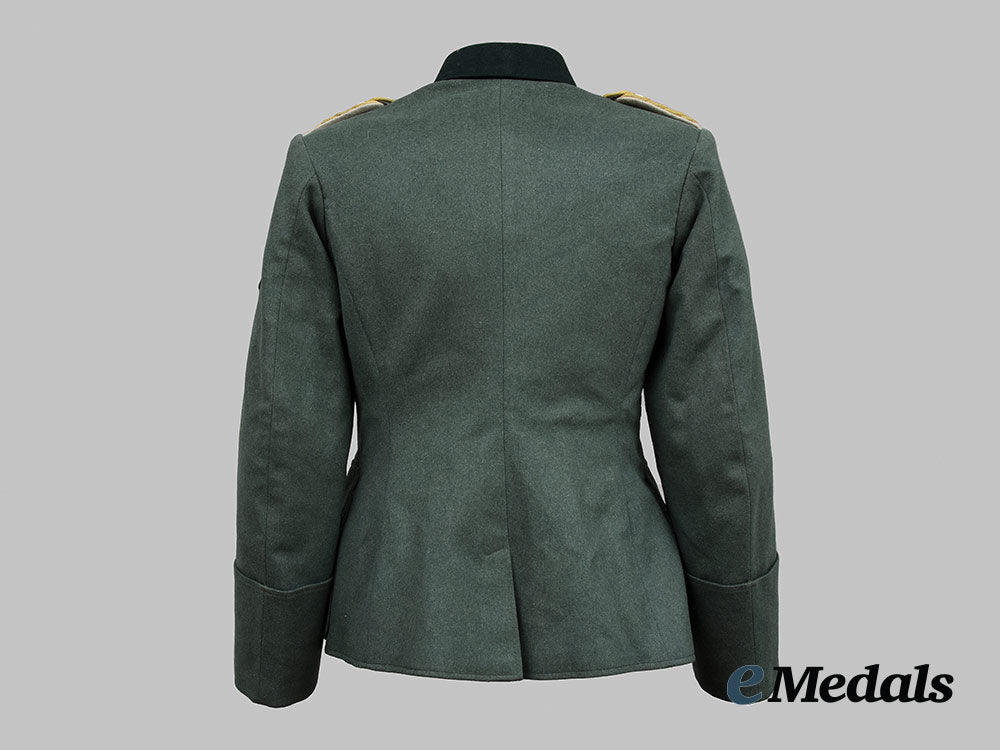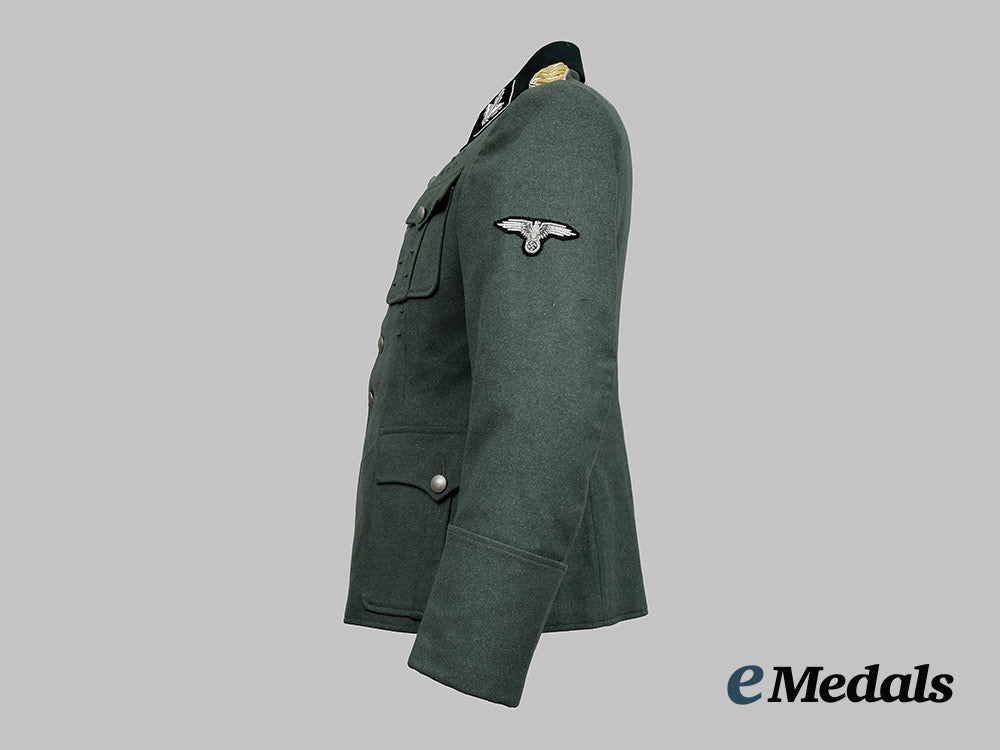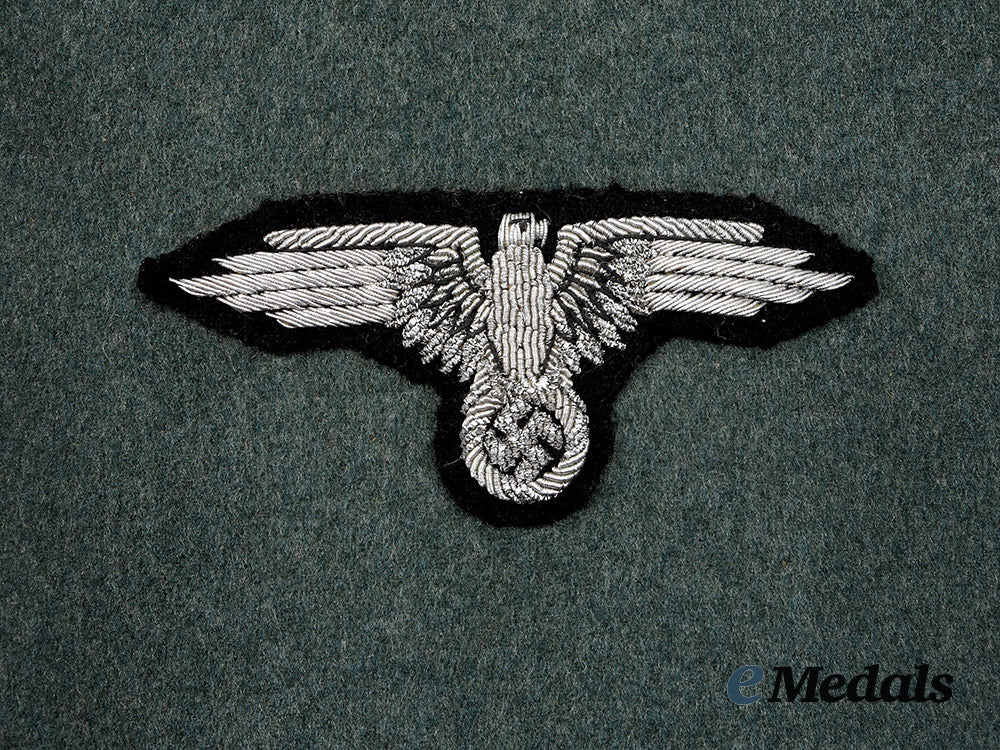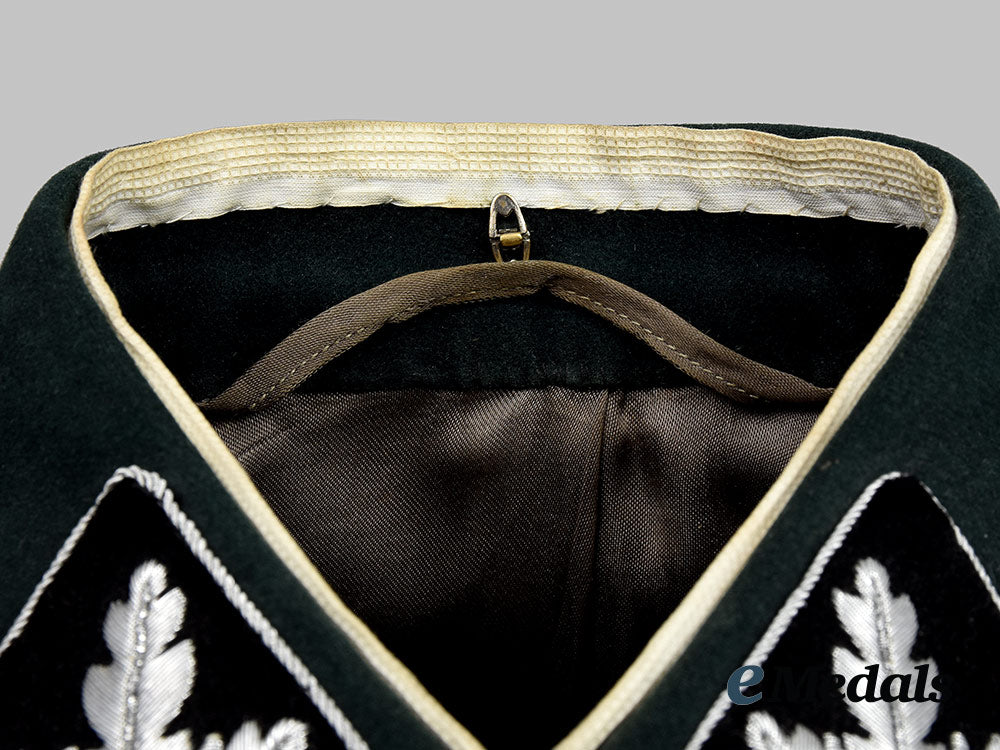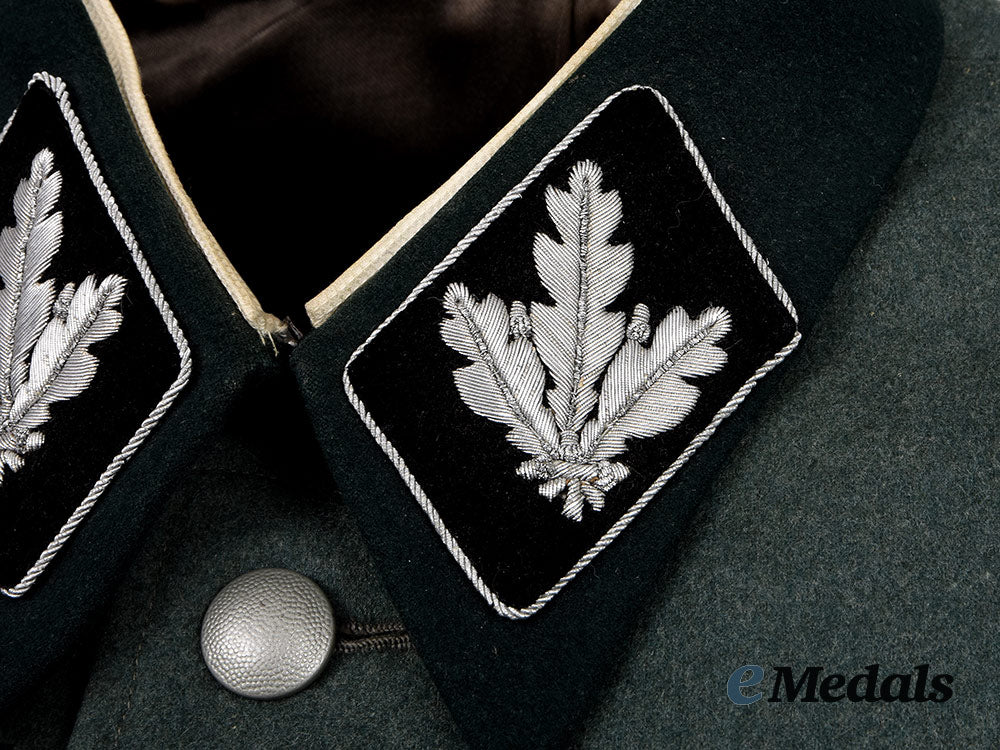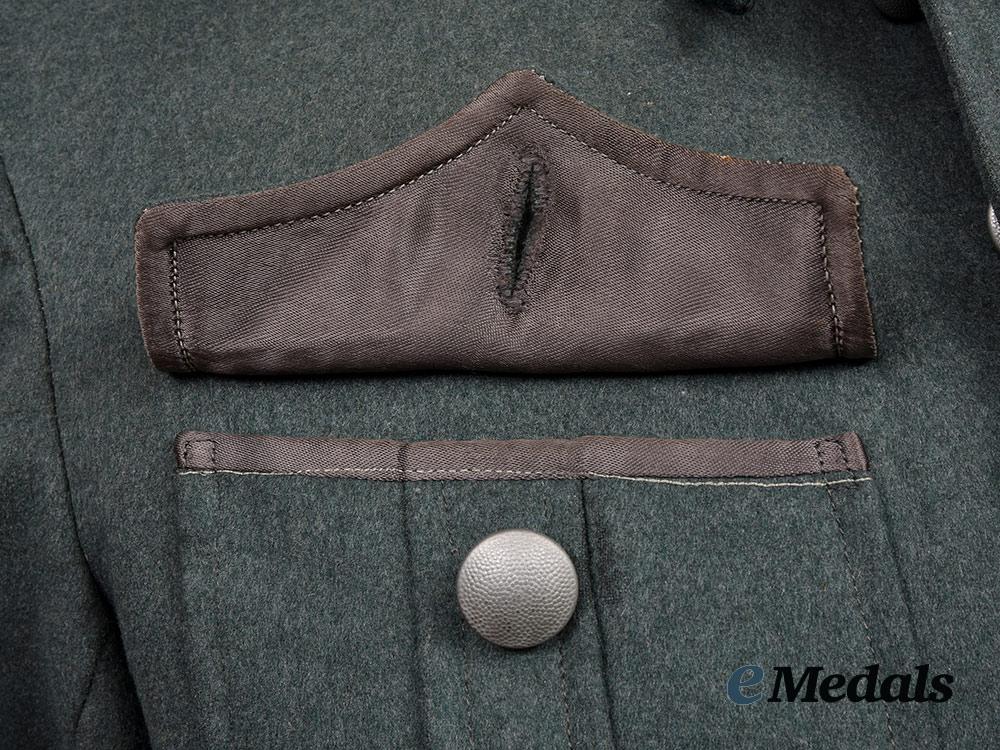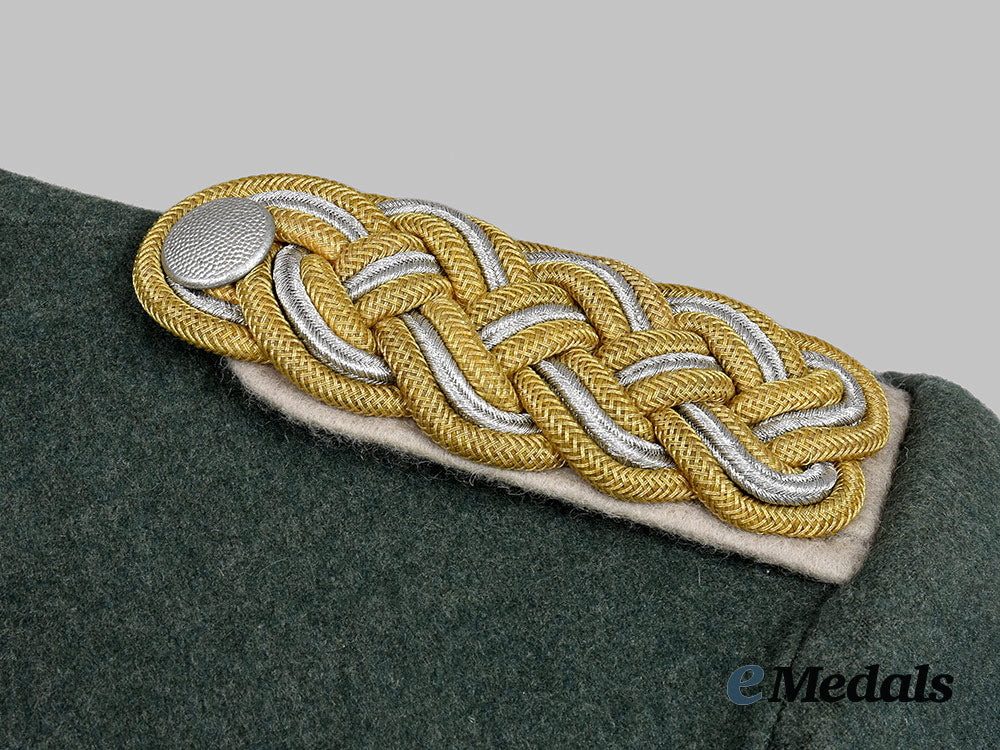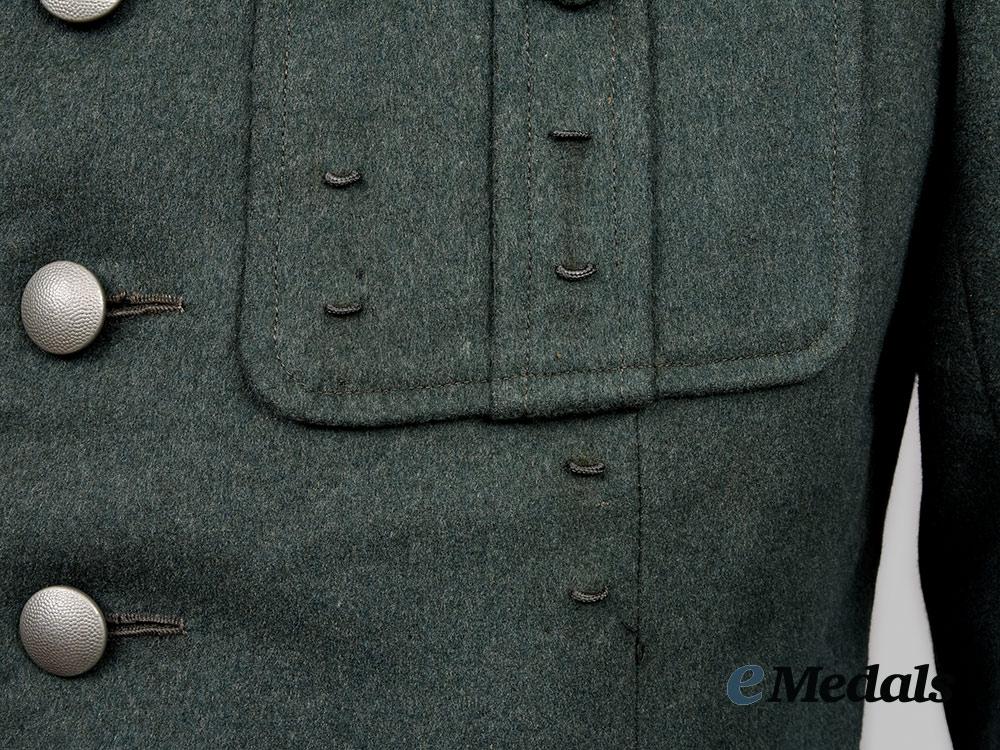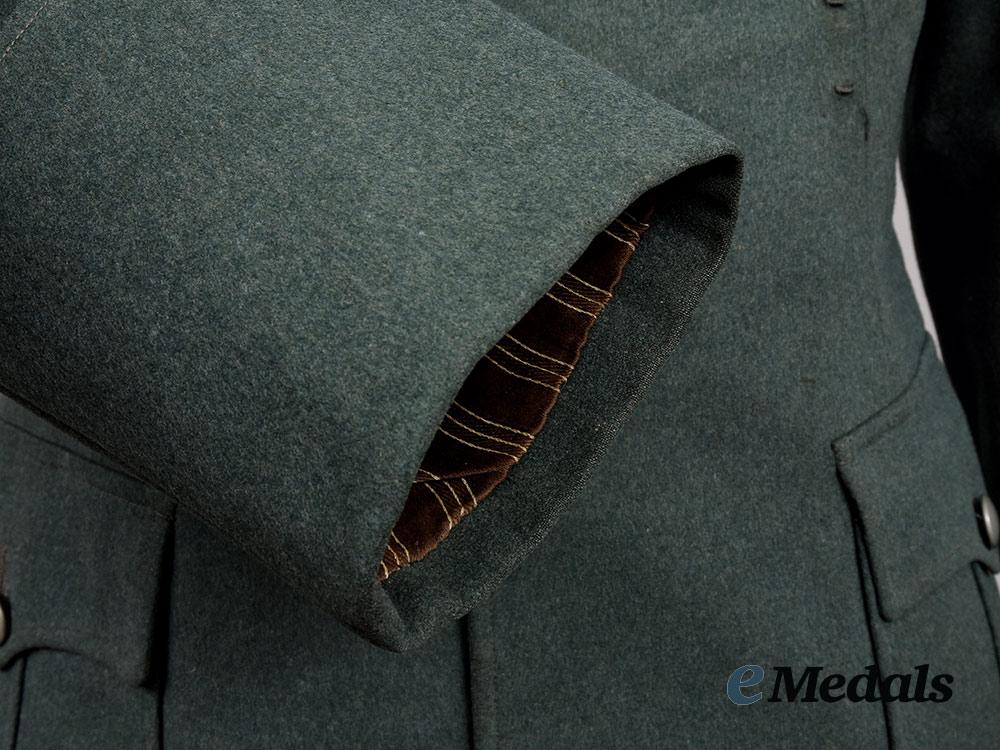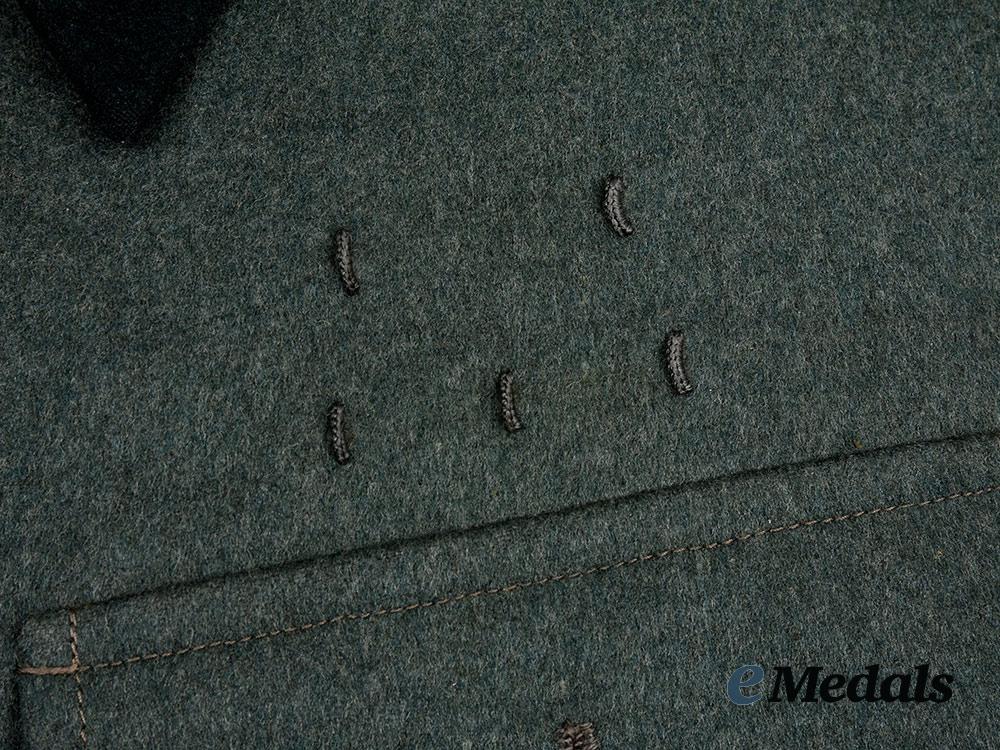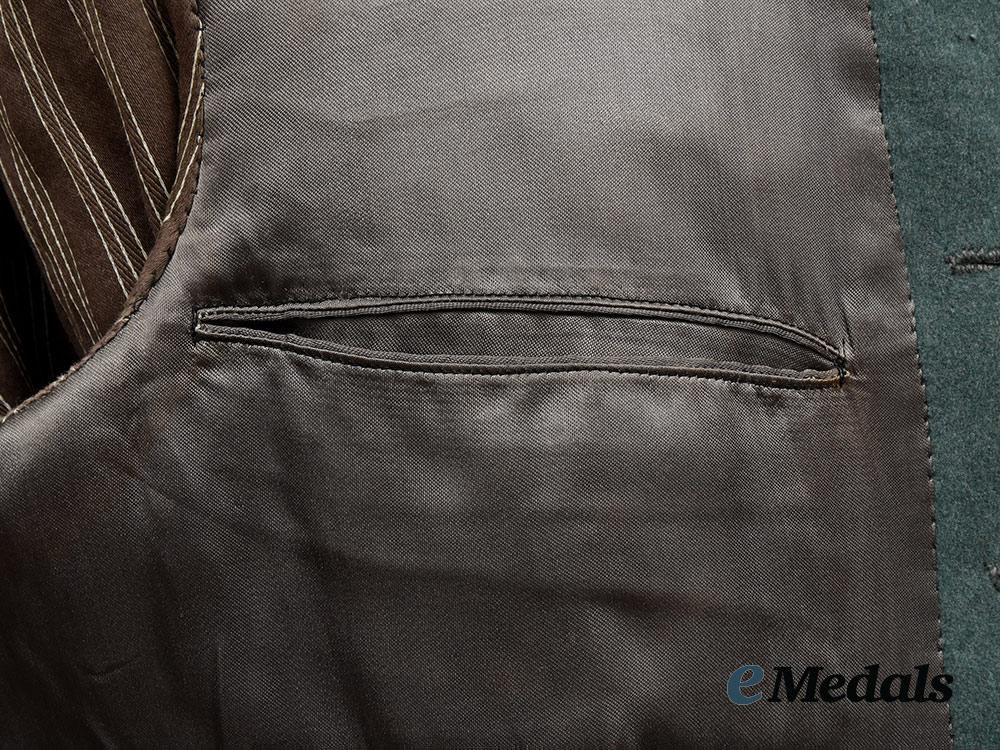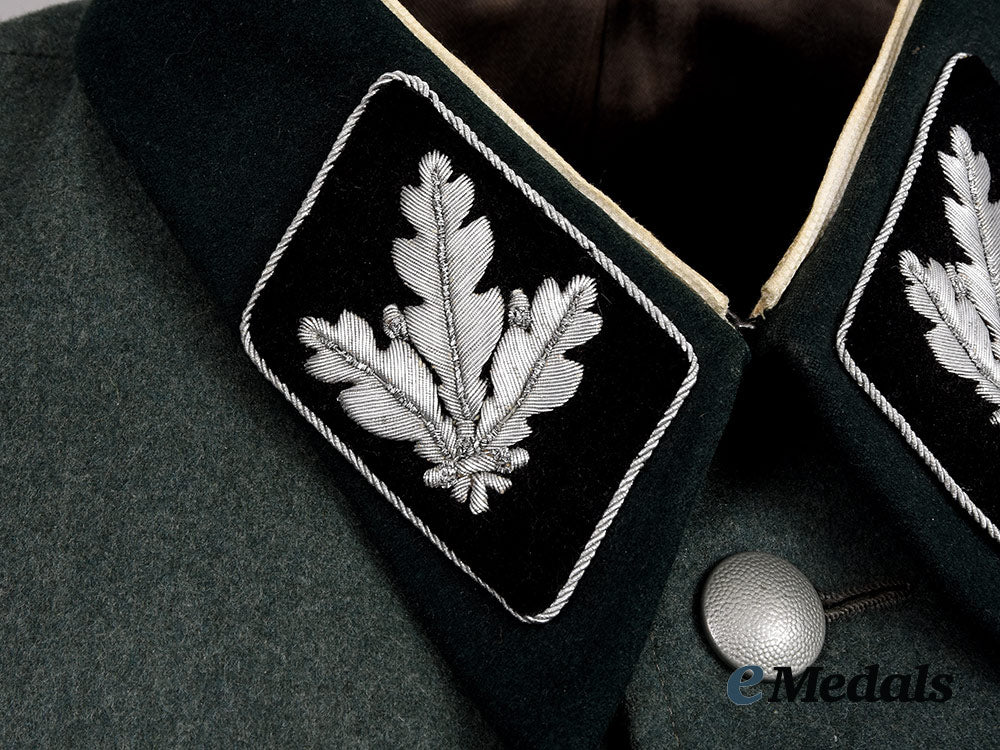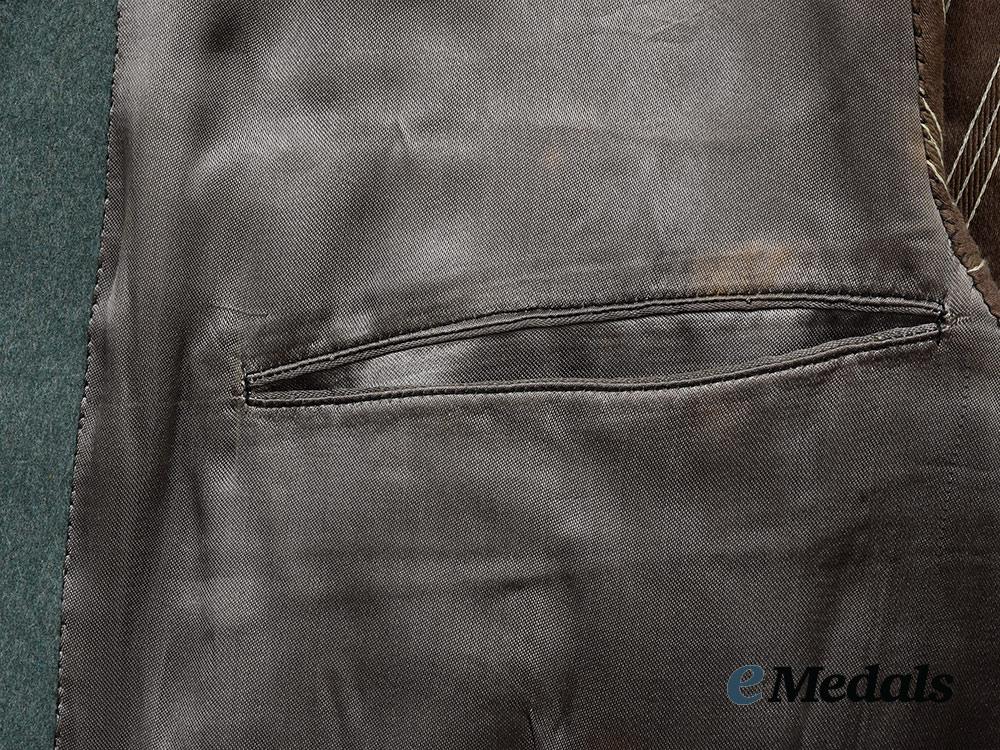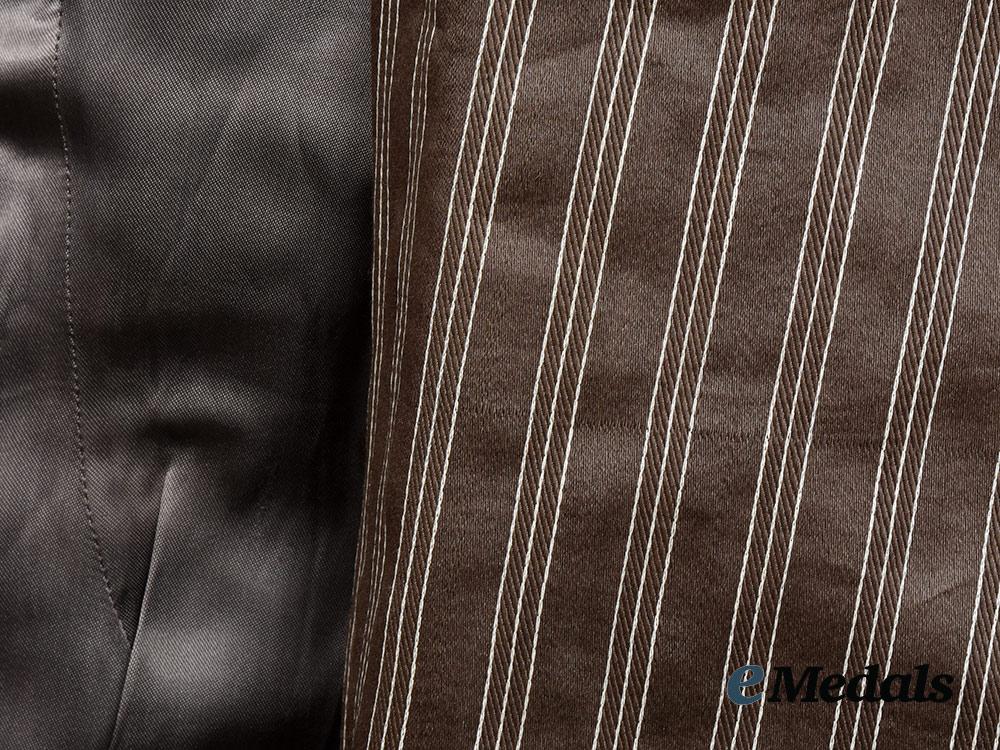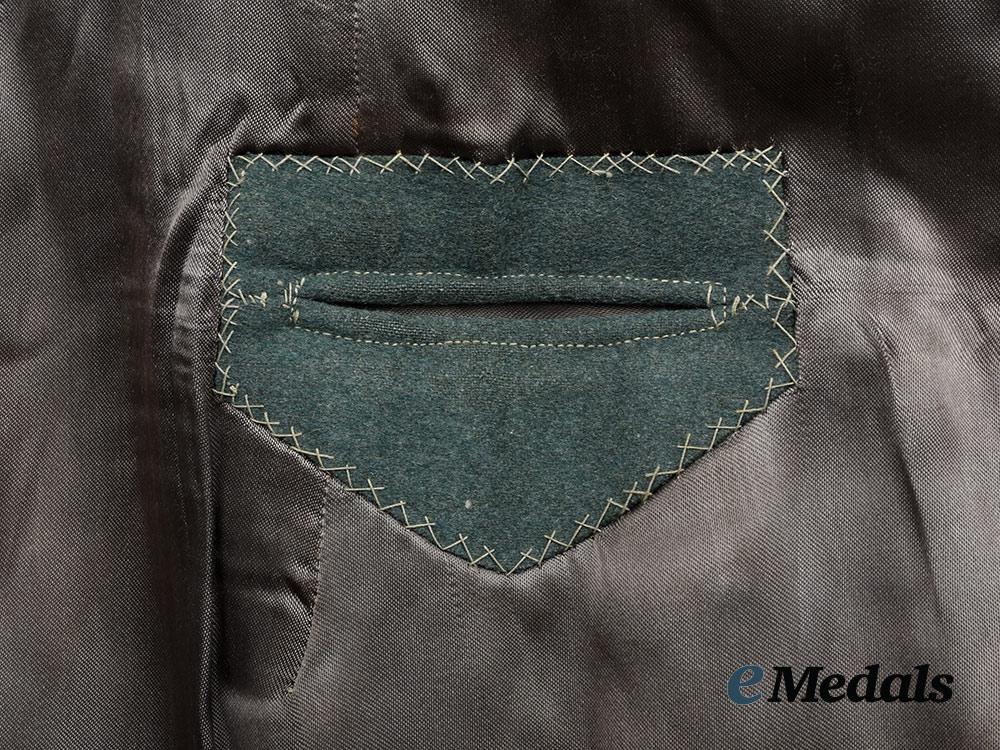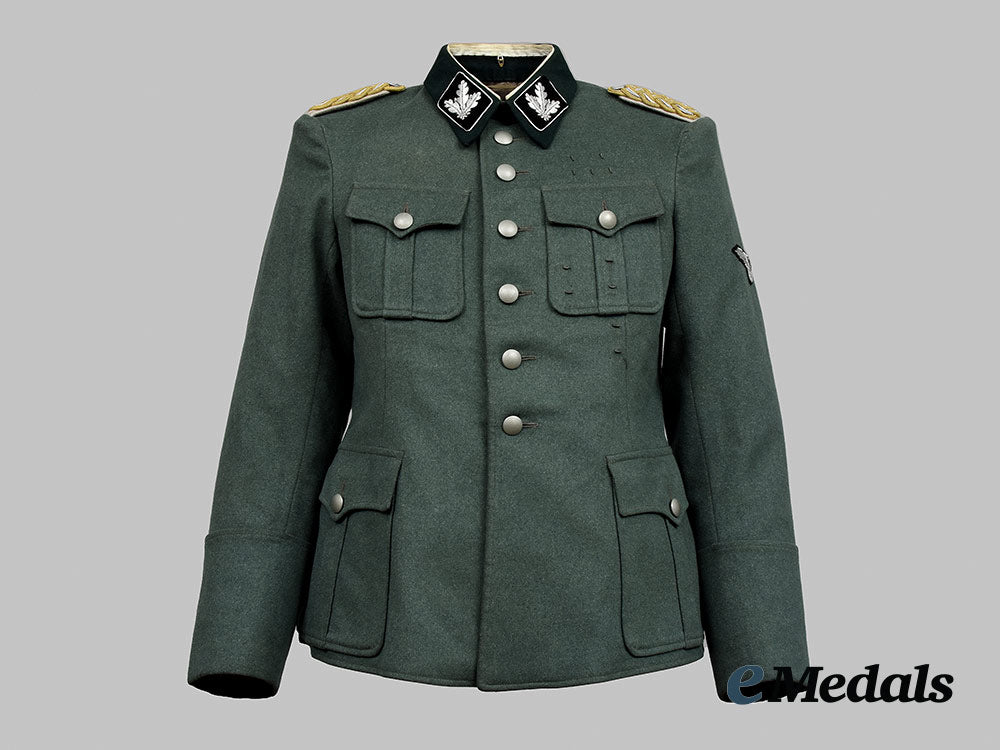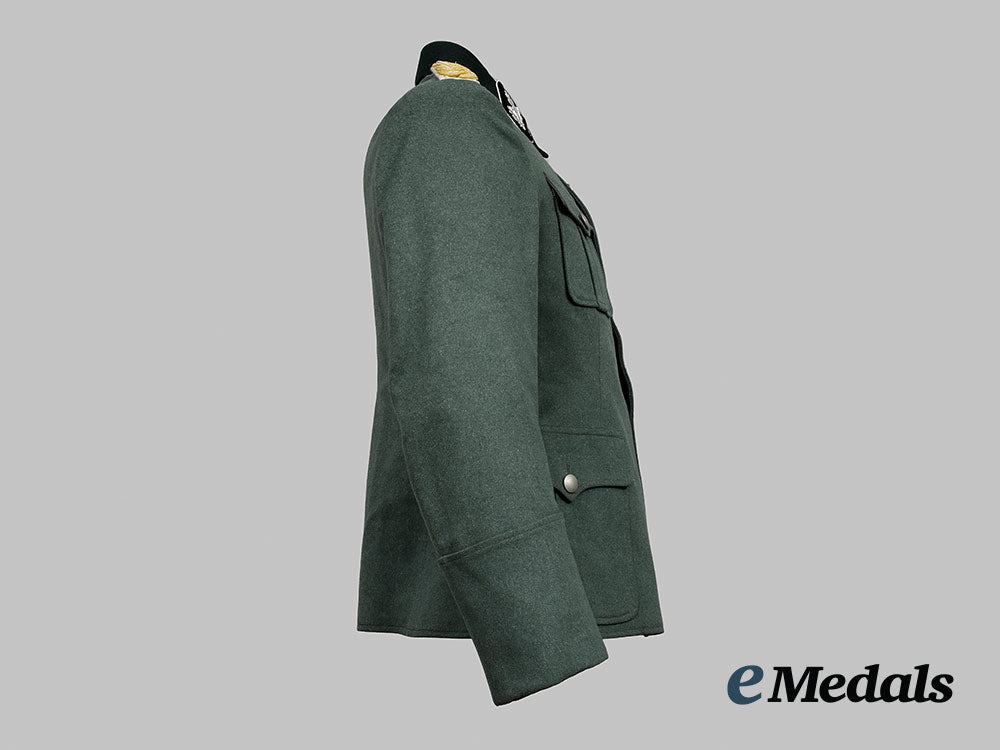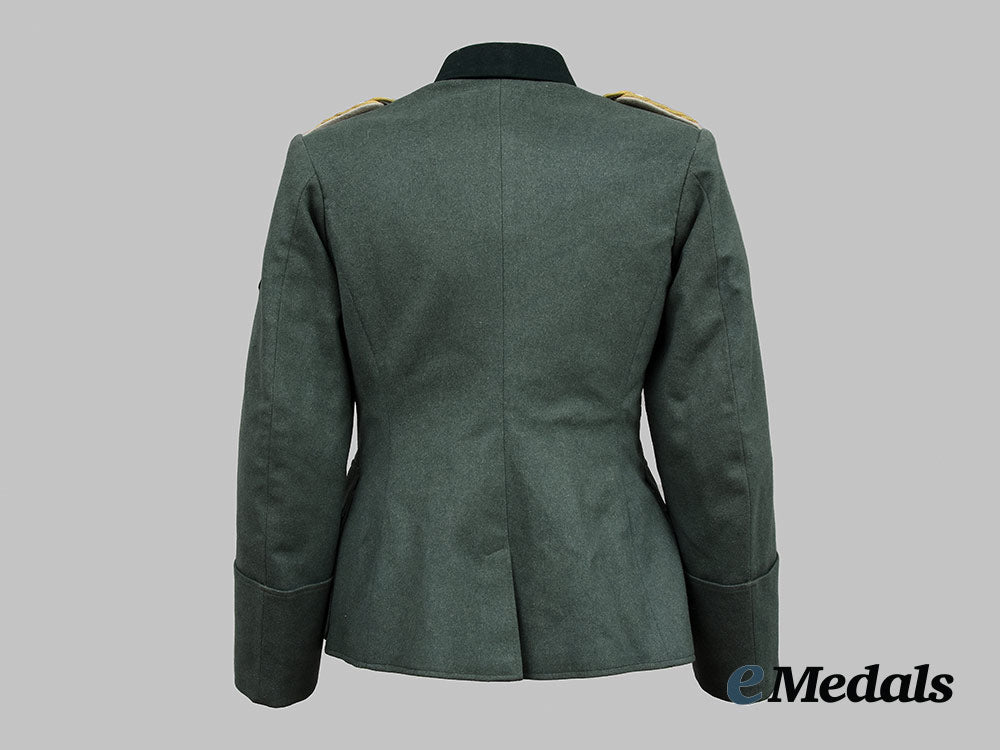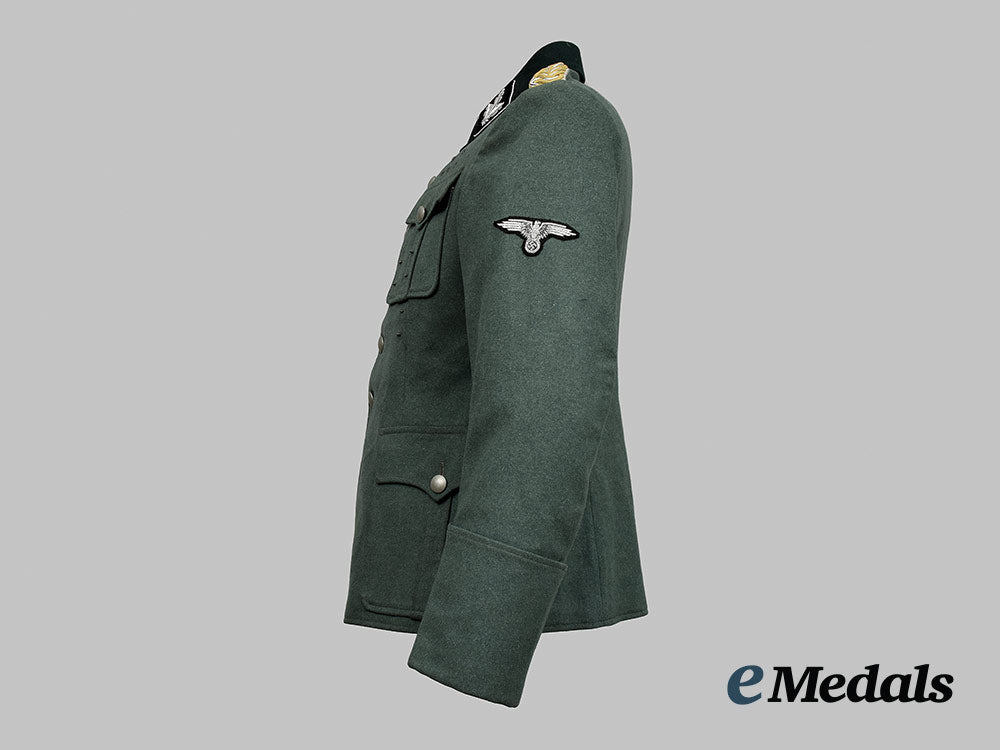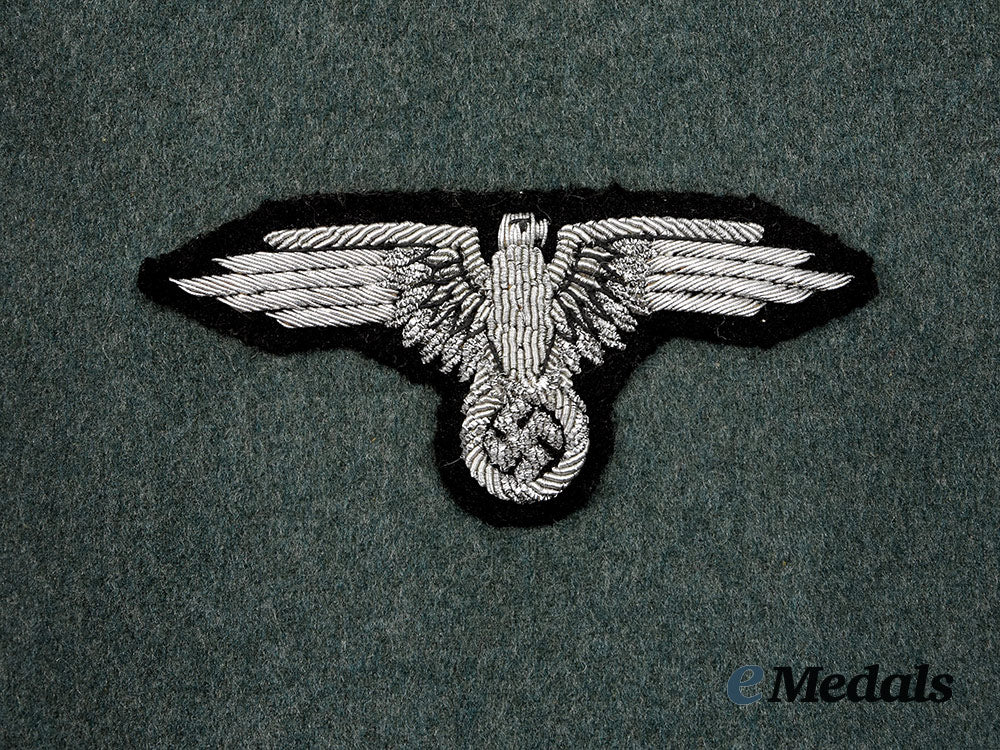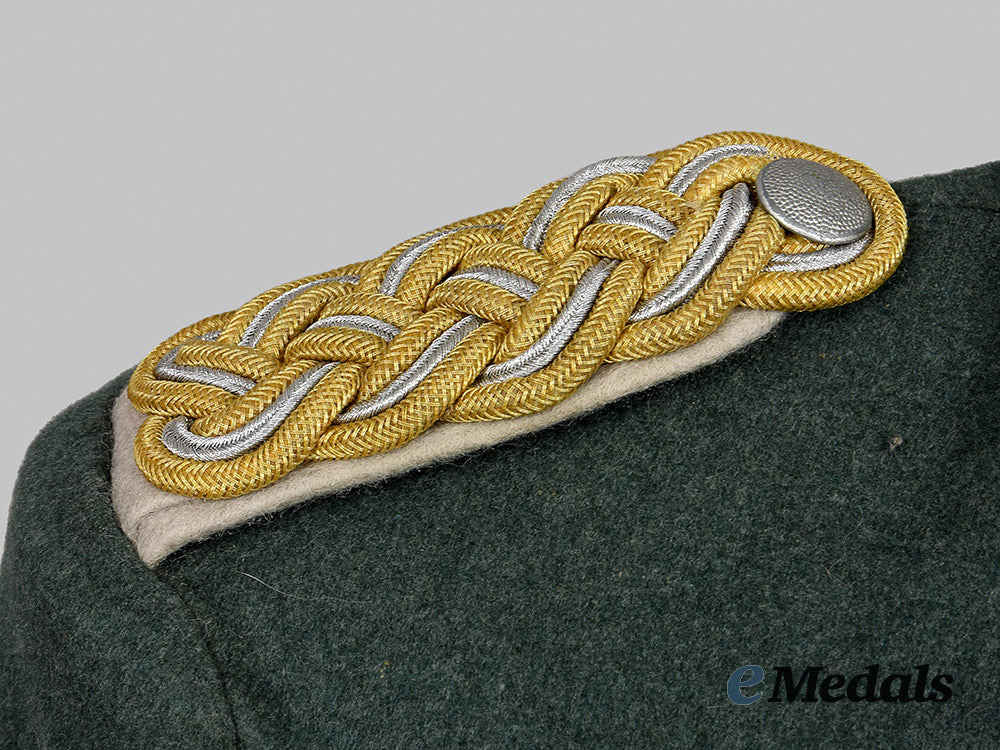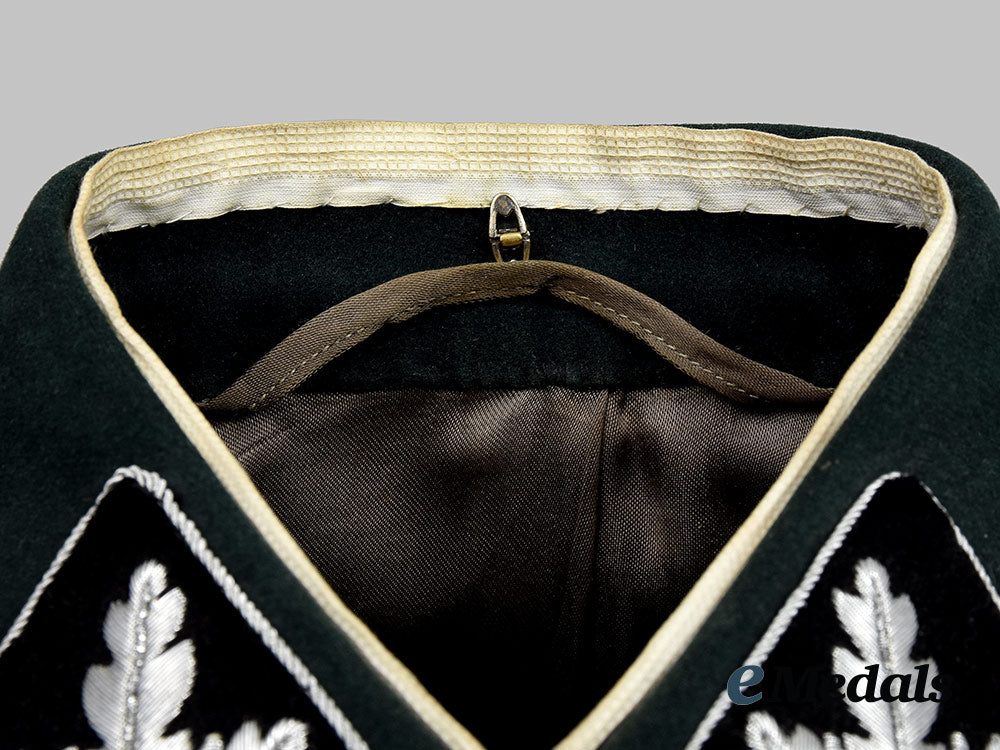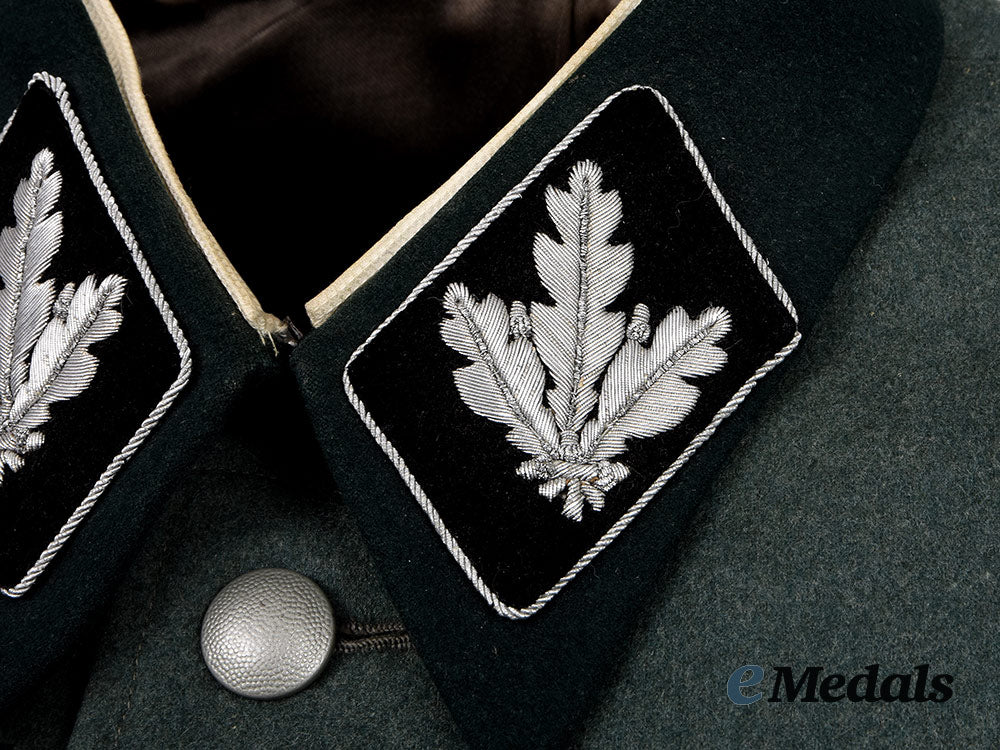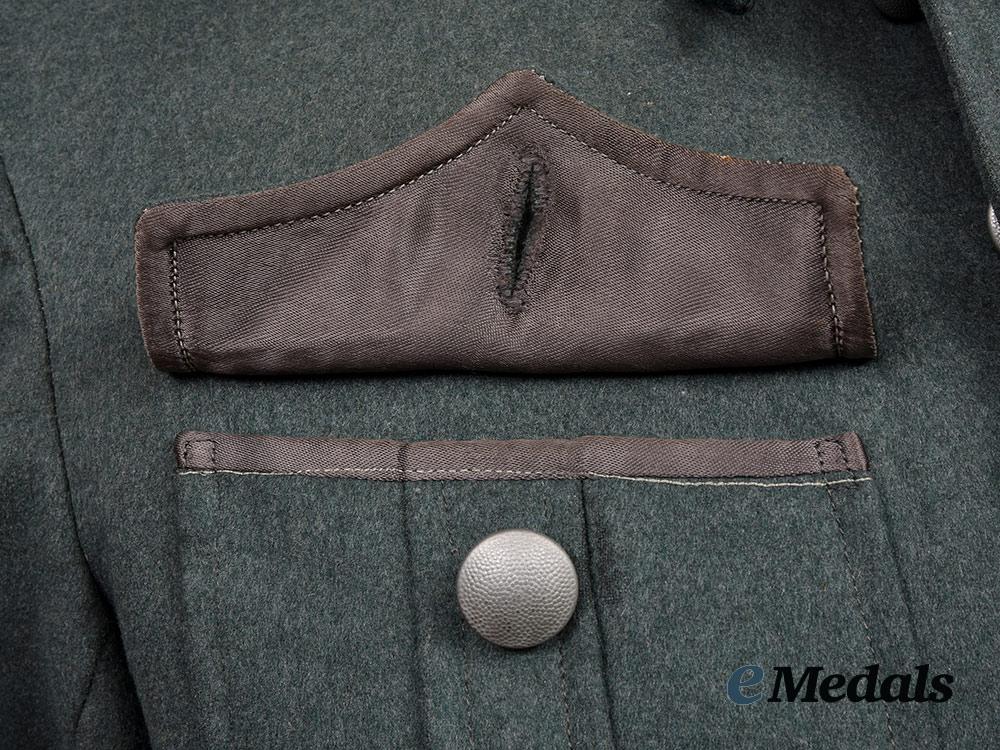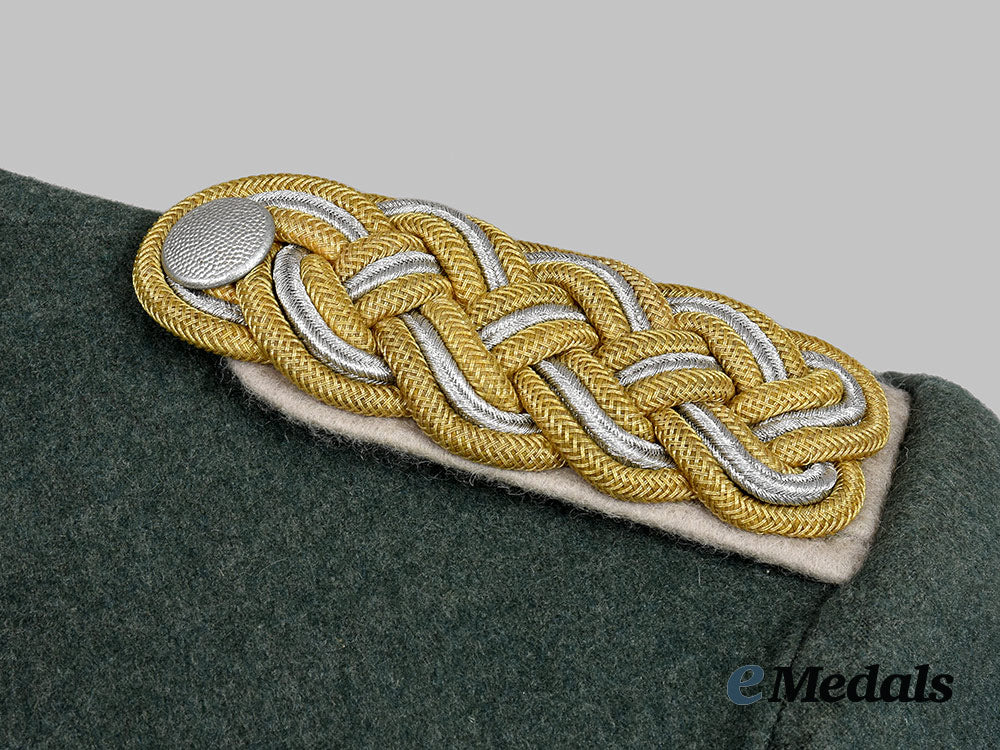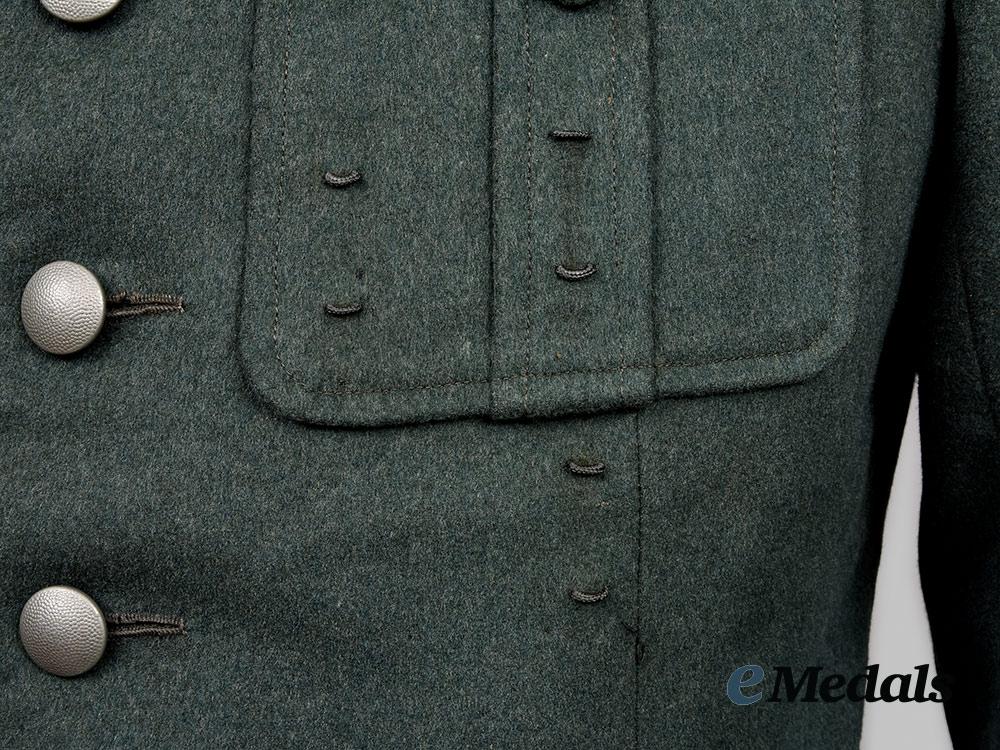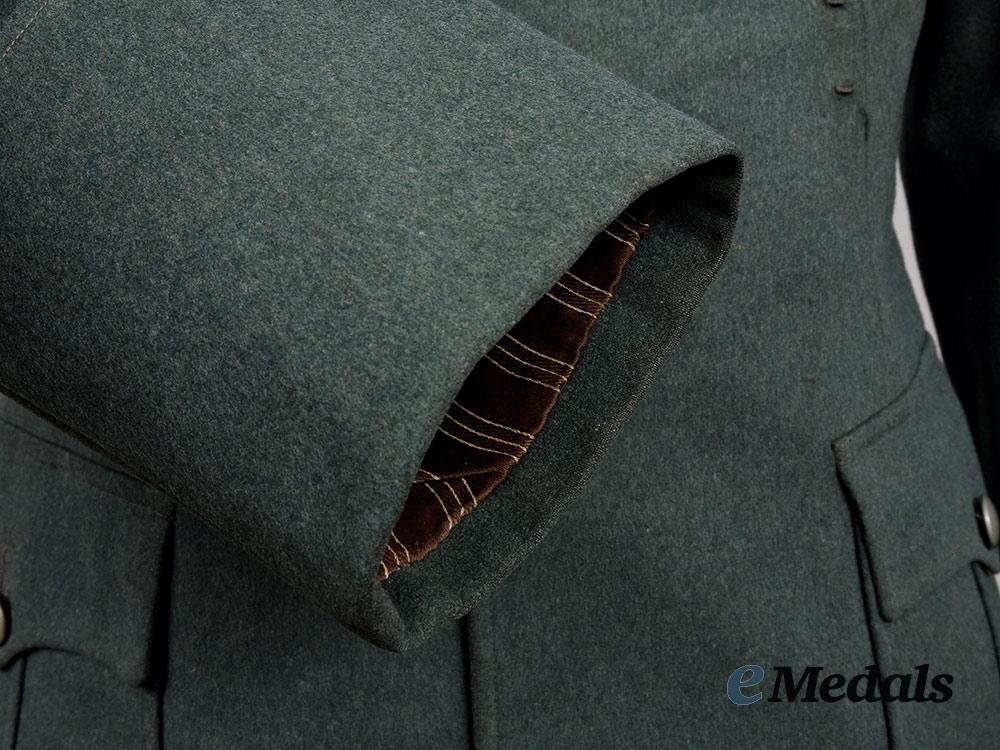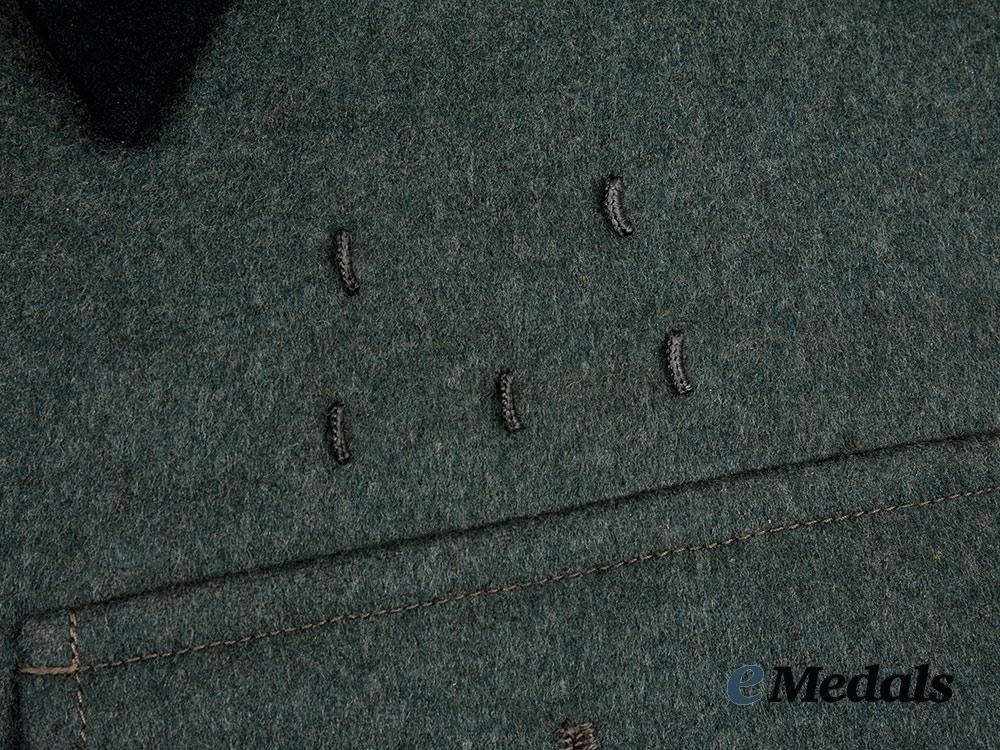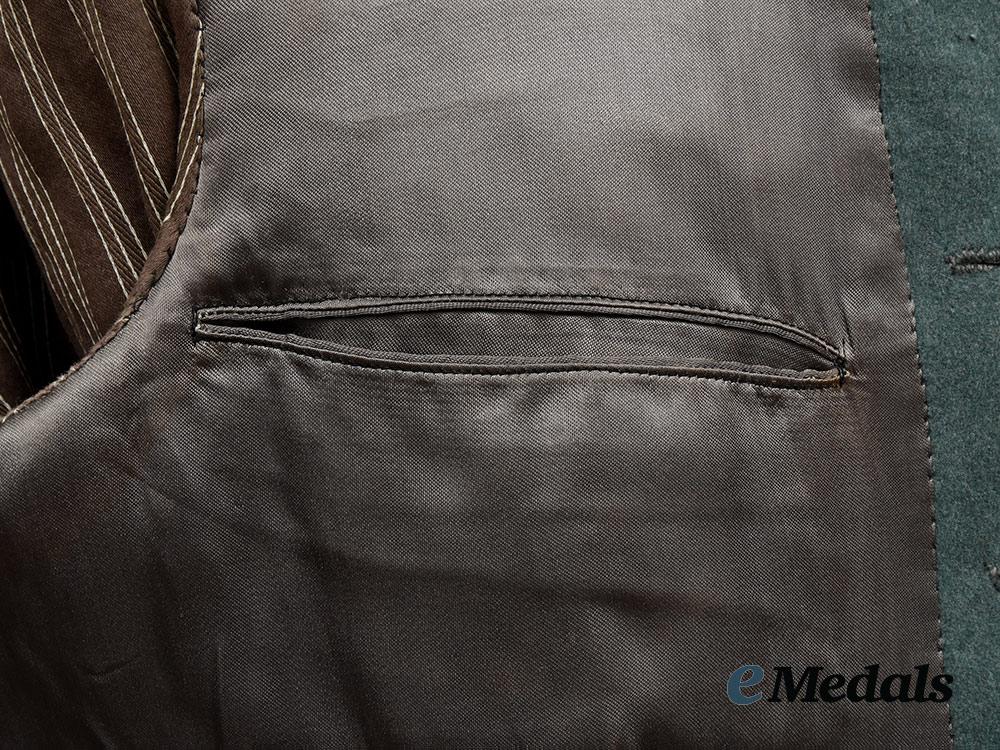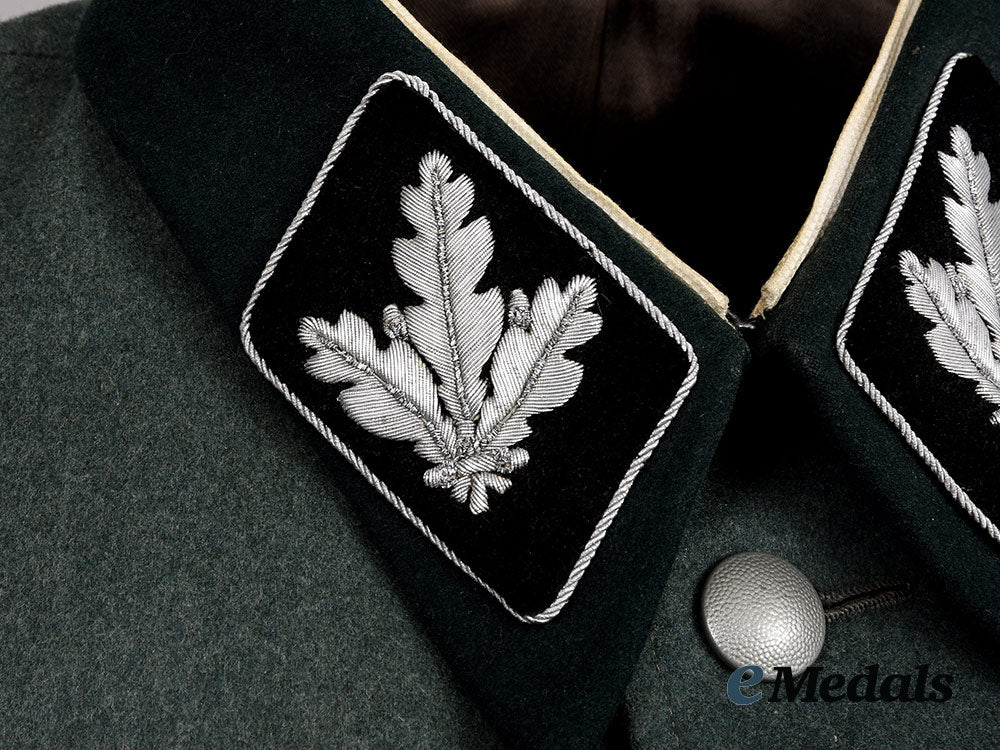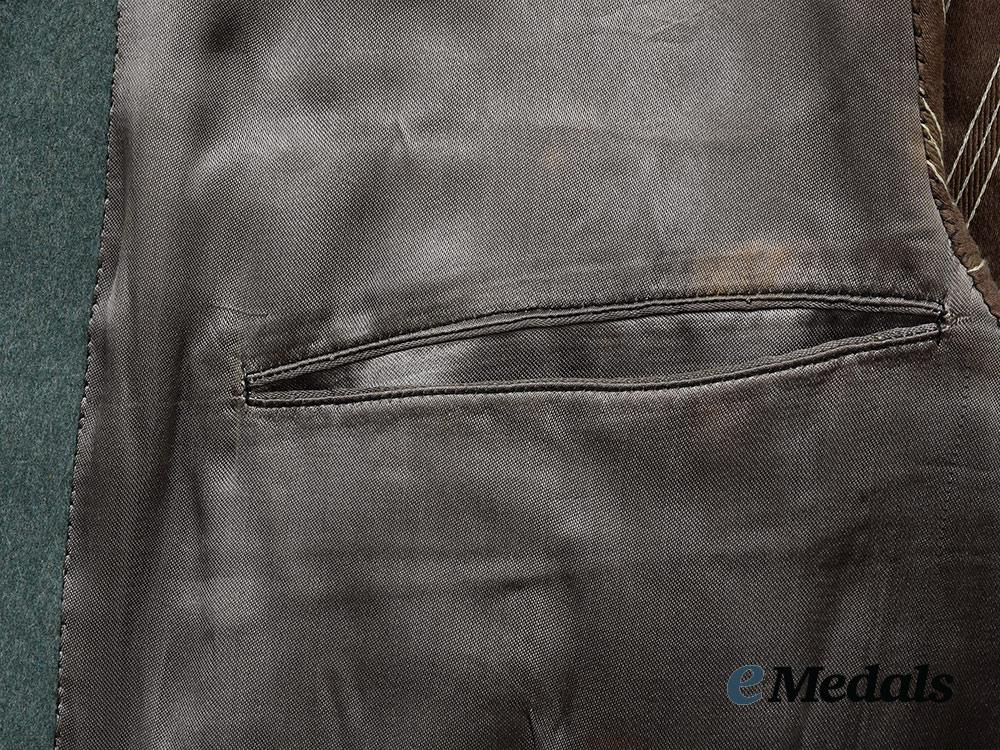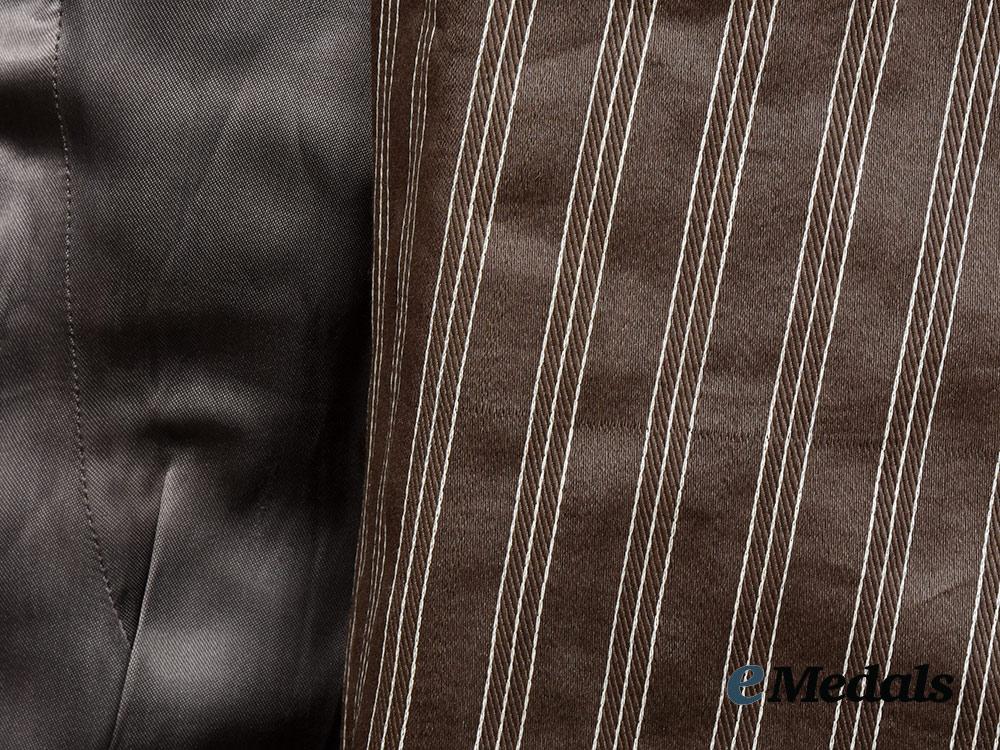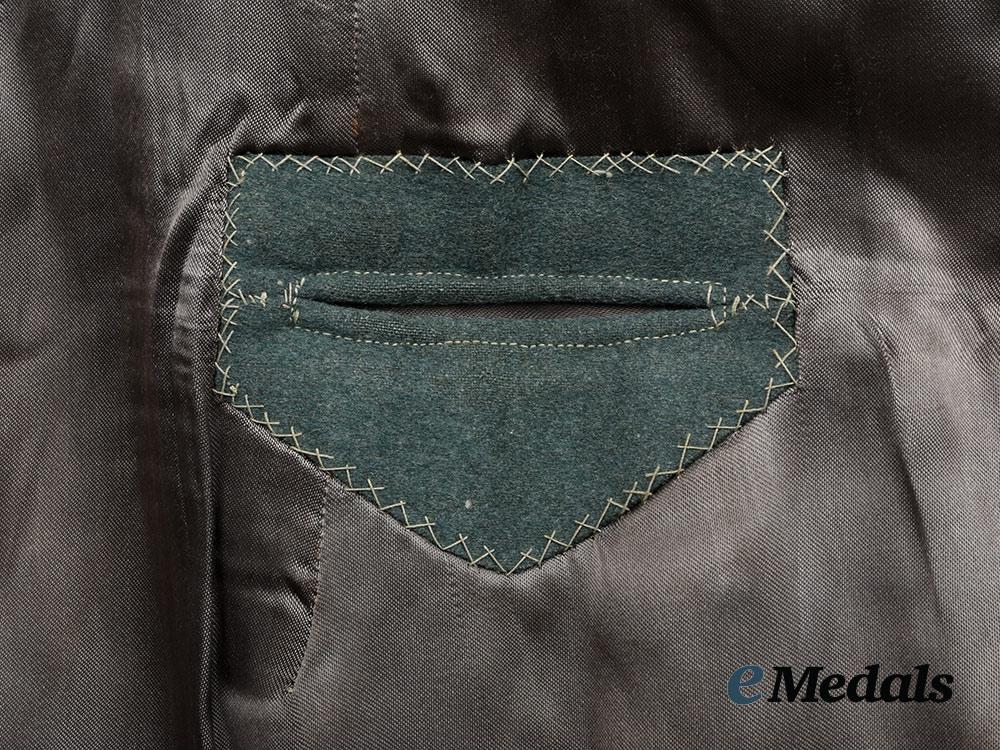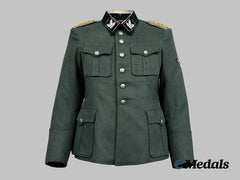
LOADING ...
In response to evolving domestic opinion, eMedals Inc has made the conscious decision to remove the presentation of German Third Reich historical artifacts from our online catalogue. For three decades, eMedals Inc has made an effort to preserve history in all its forms. As historians and researchers, we have managed sensitive articles and materials with the greatest of care and respect for their past and present social context. We acknowledge the growing sentiments put forth by the Canadian public and have taken proactive actions to address this opinion.
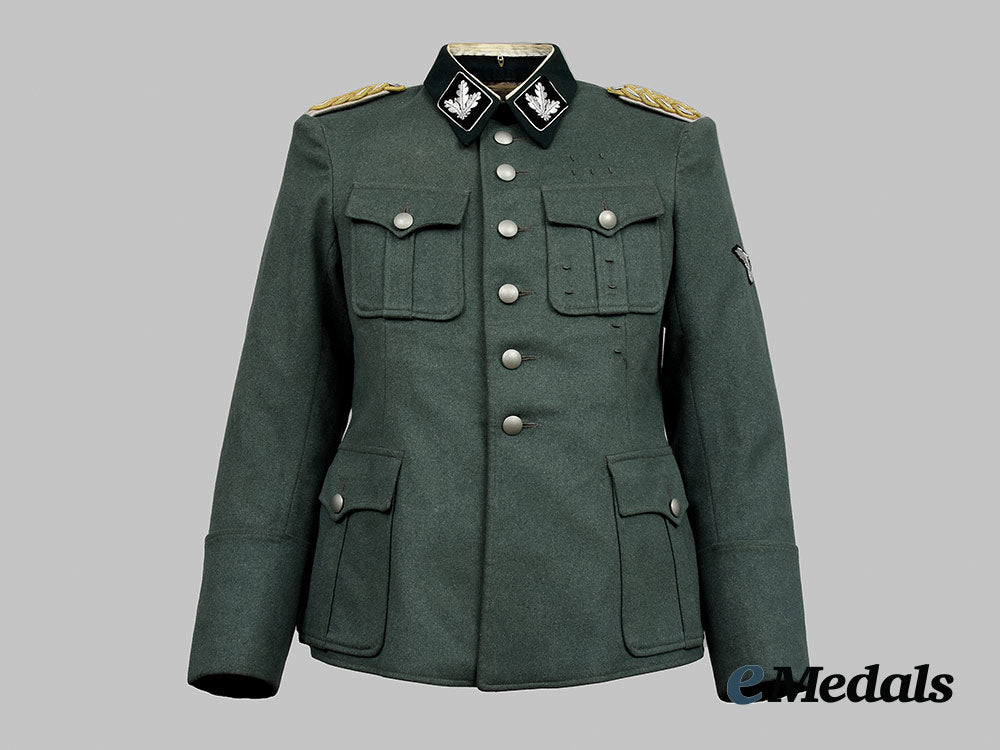
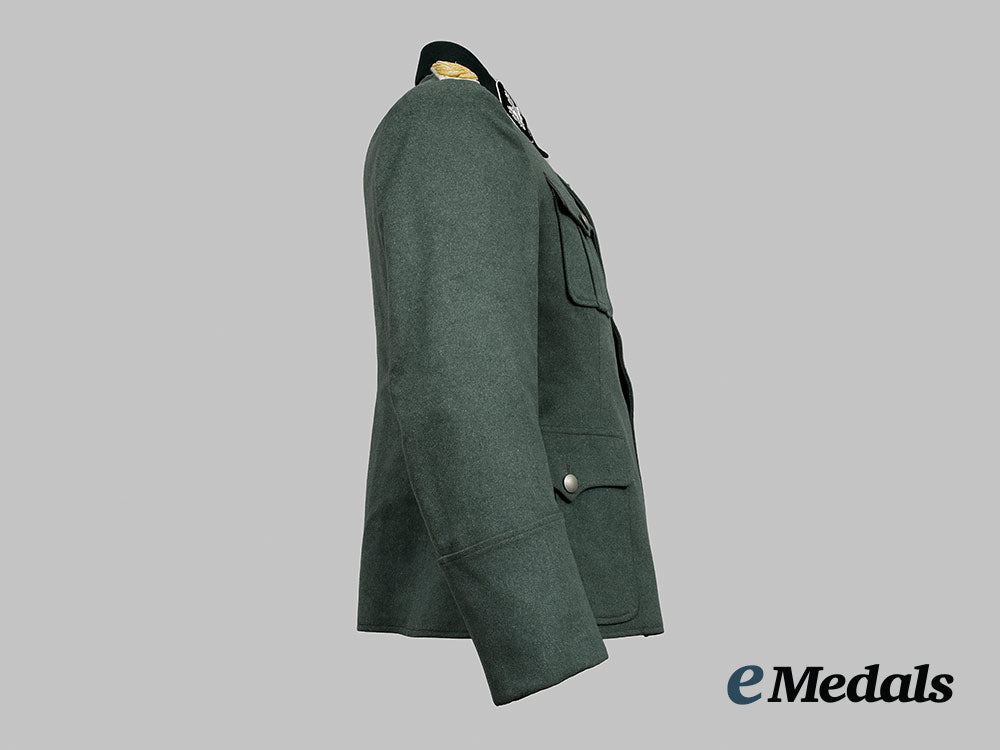
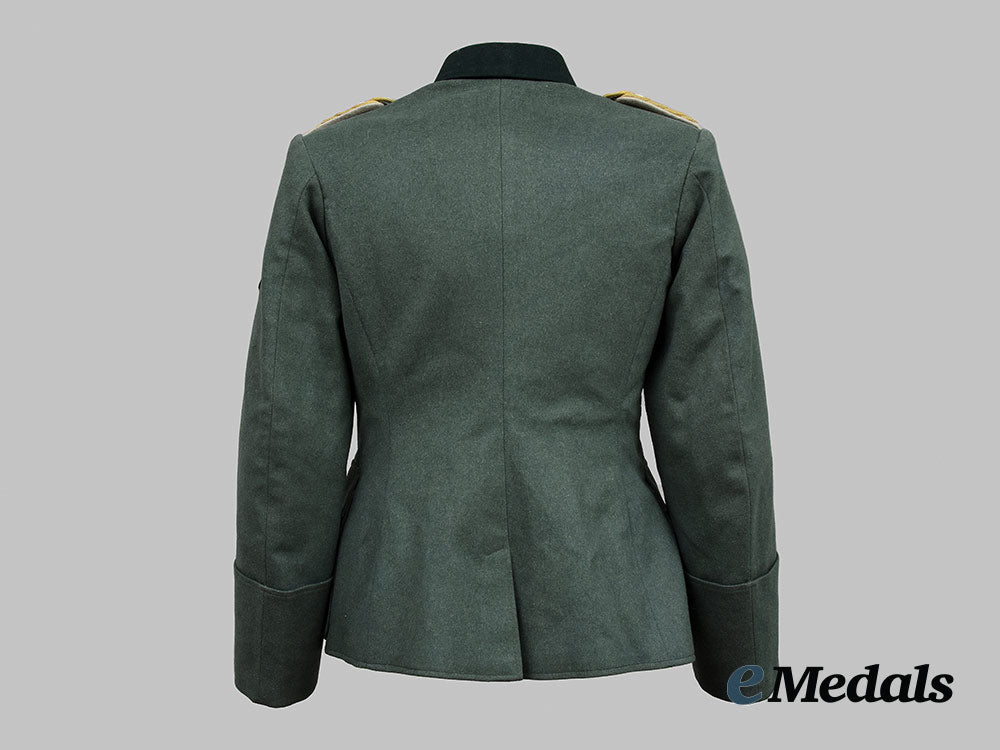
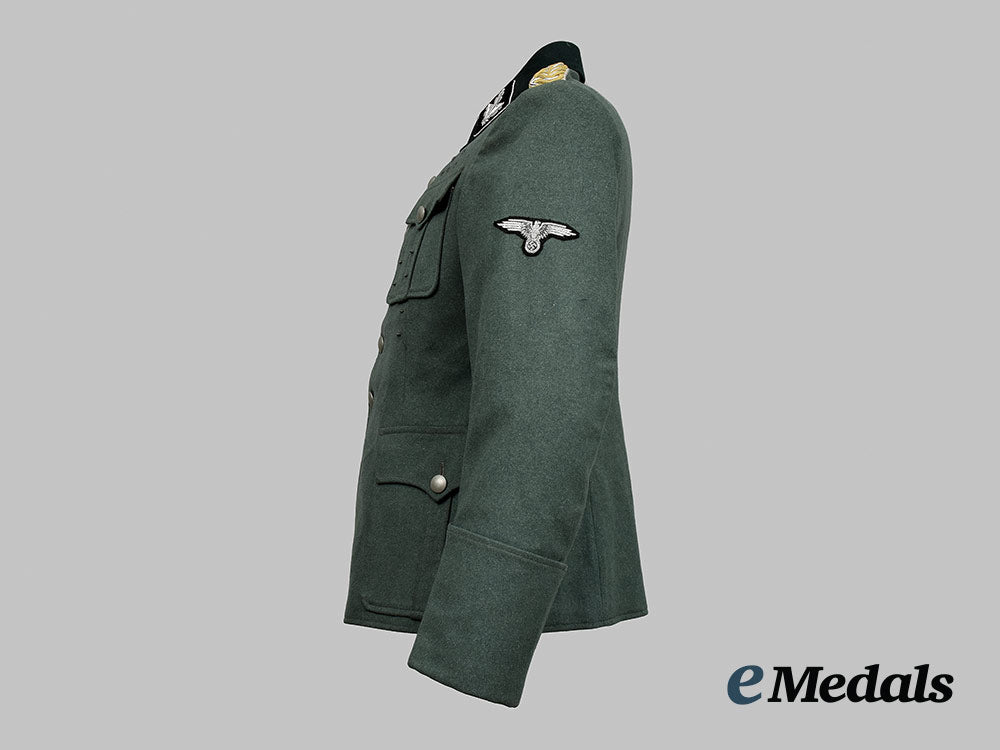
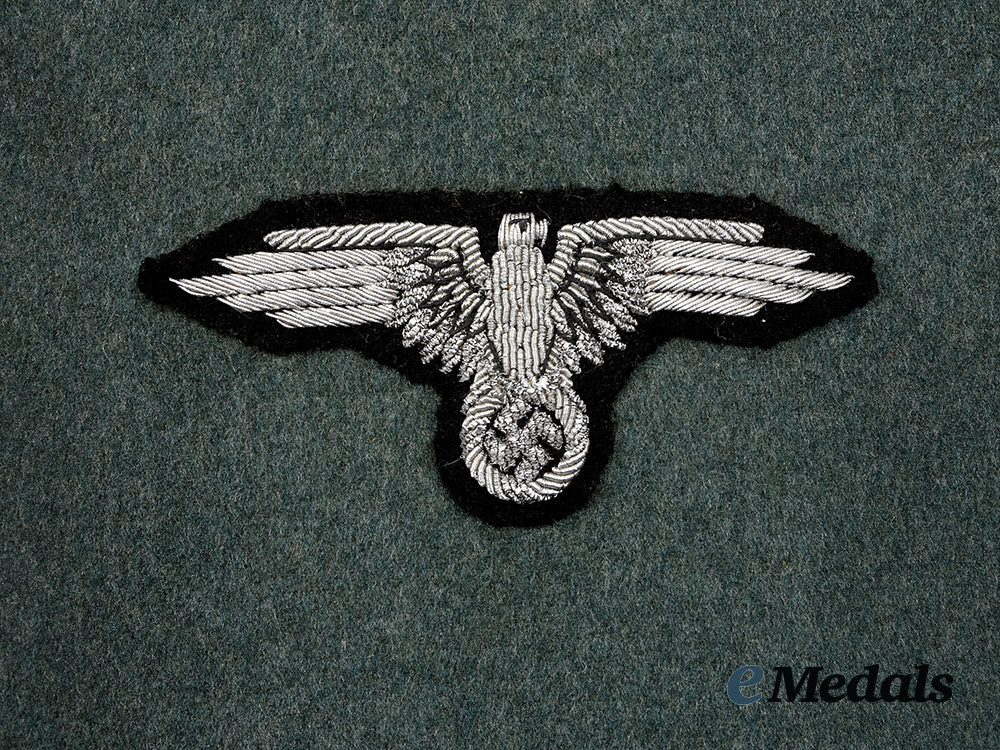
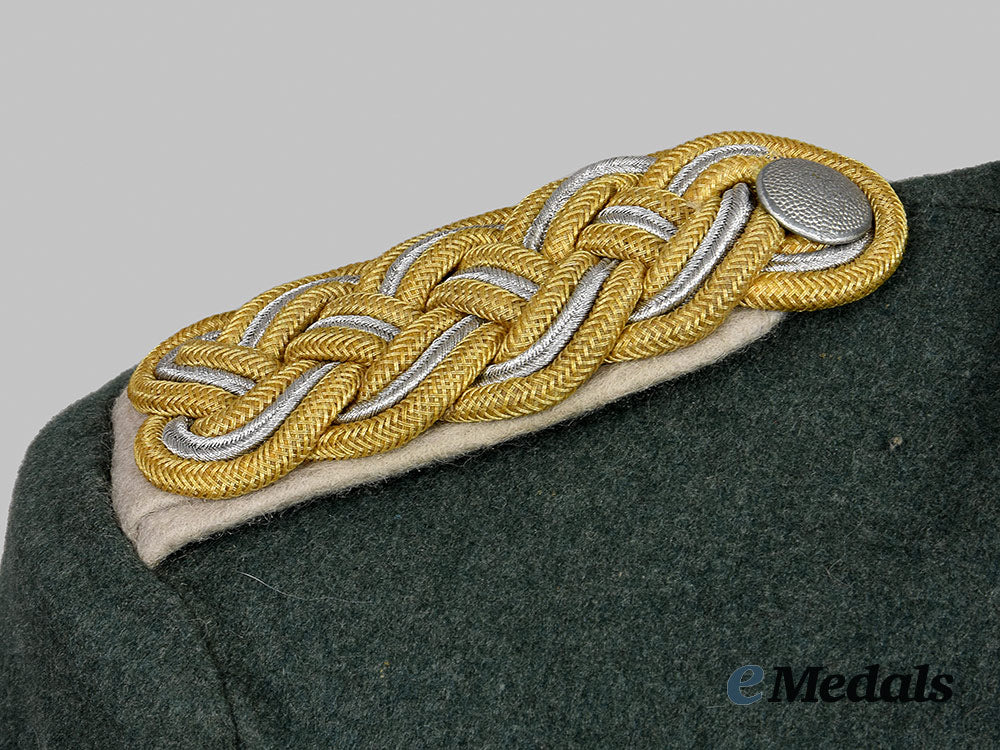
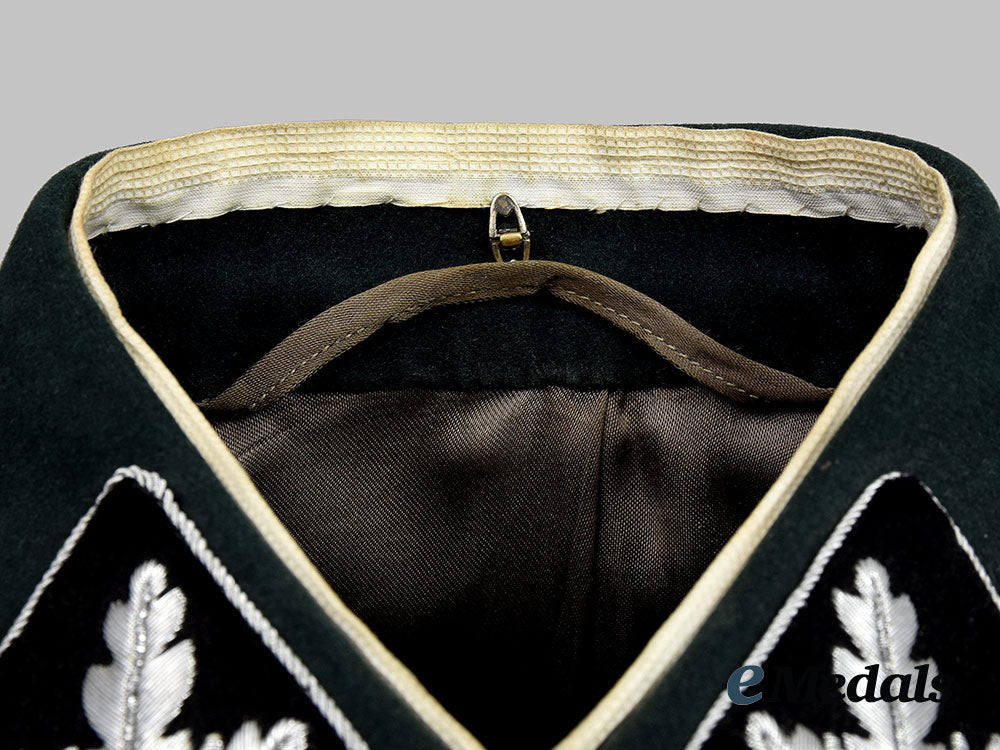
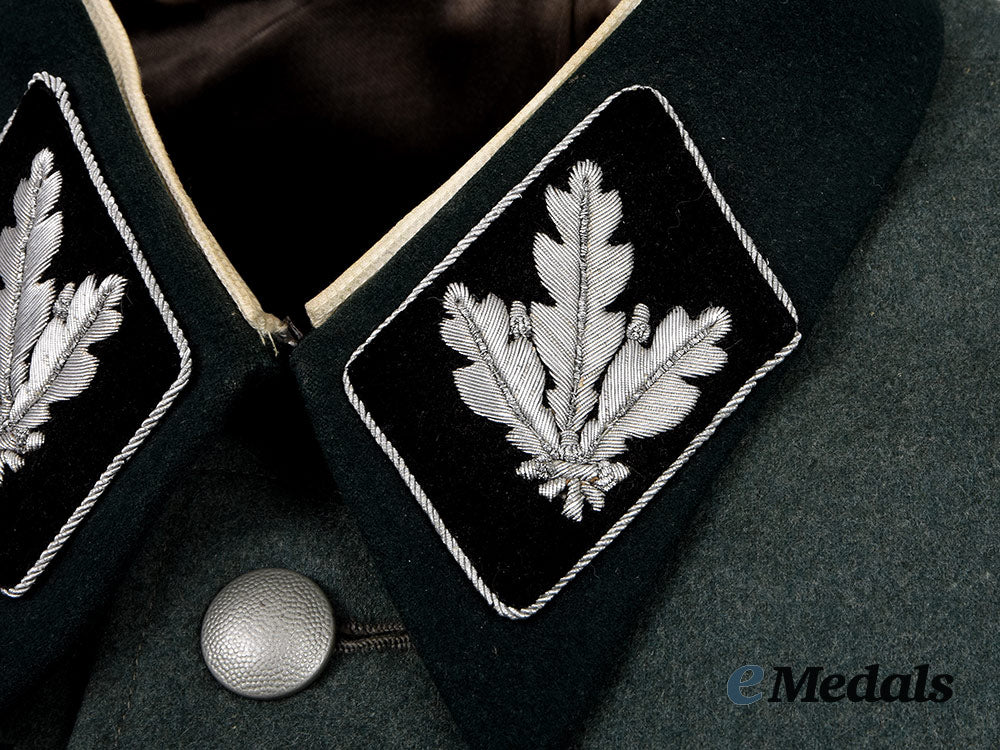
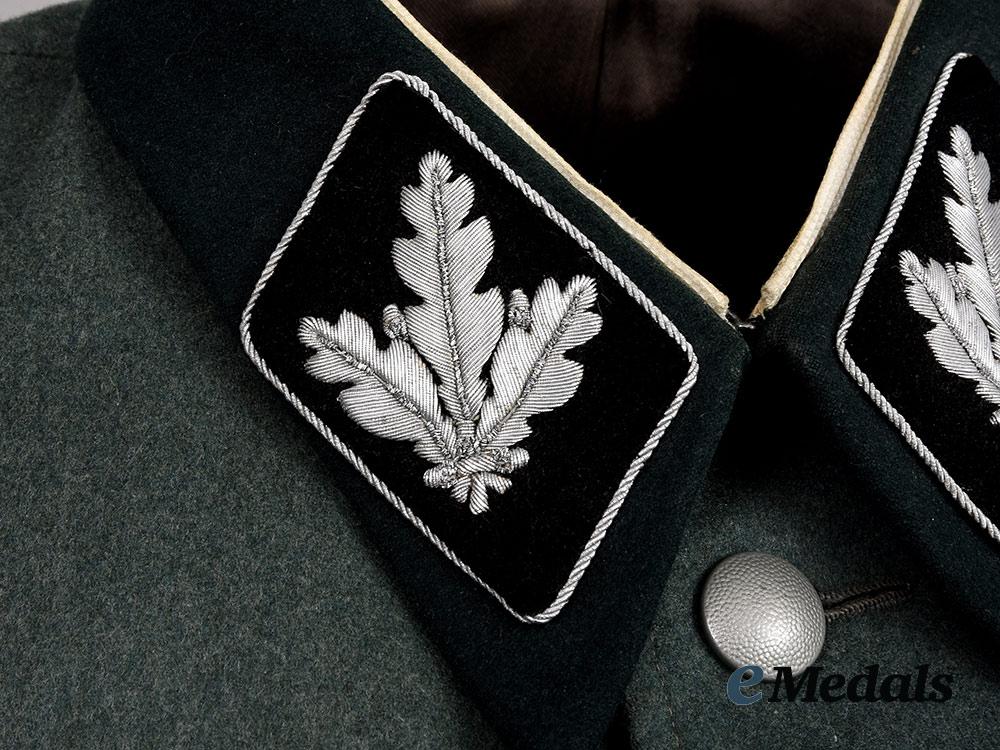
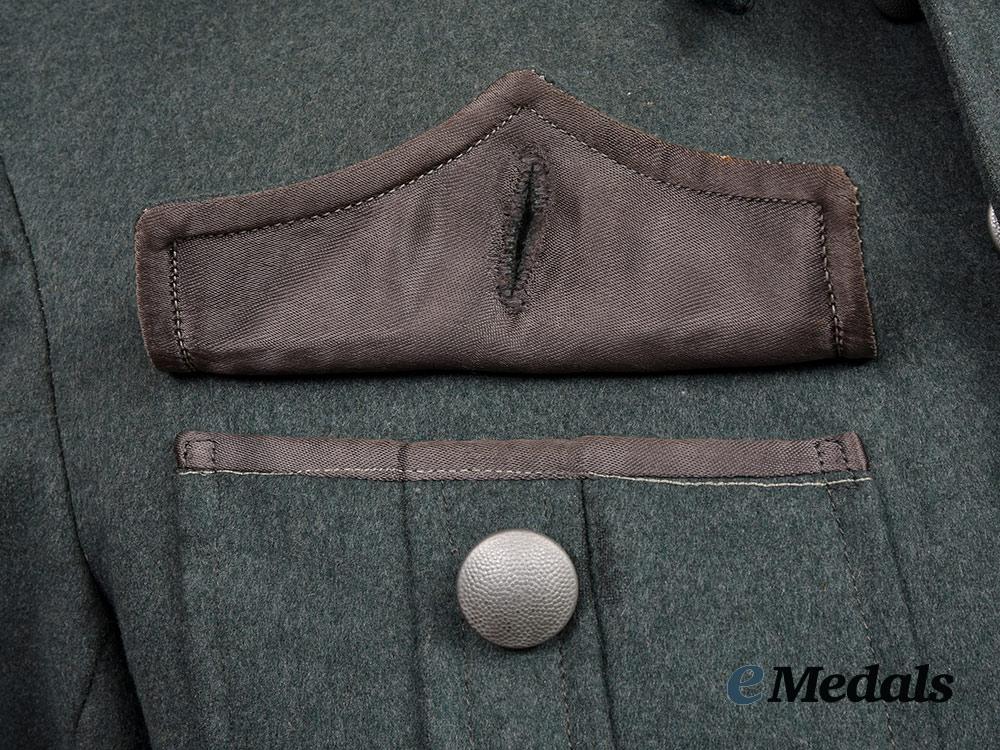
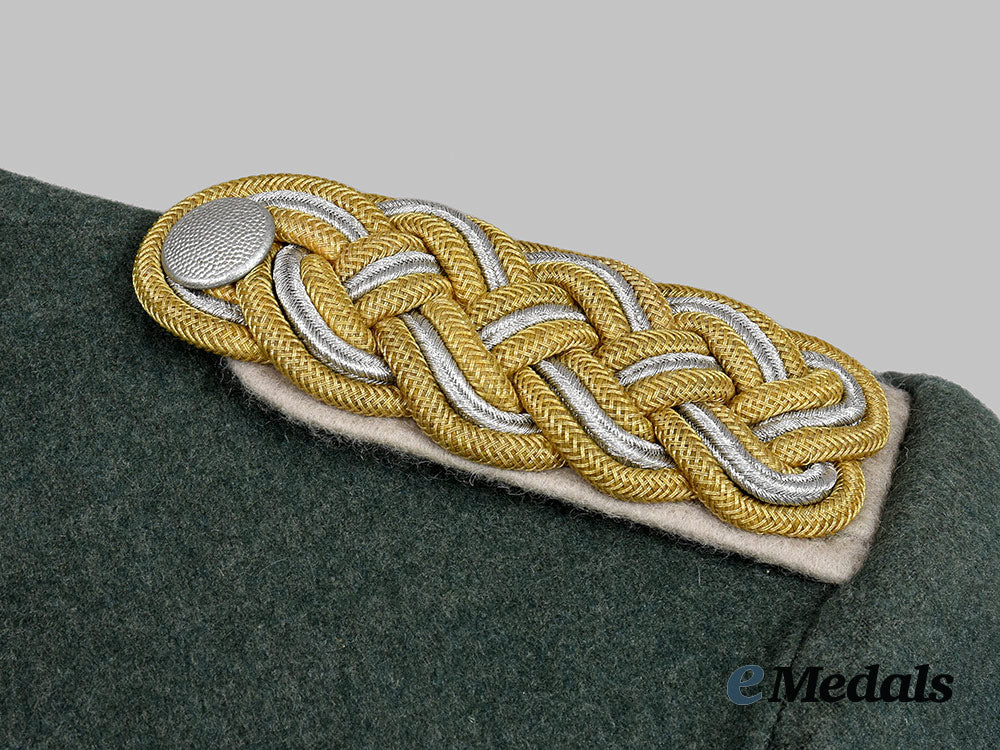
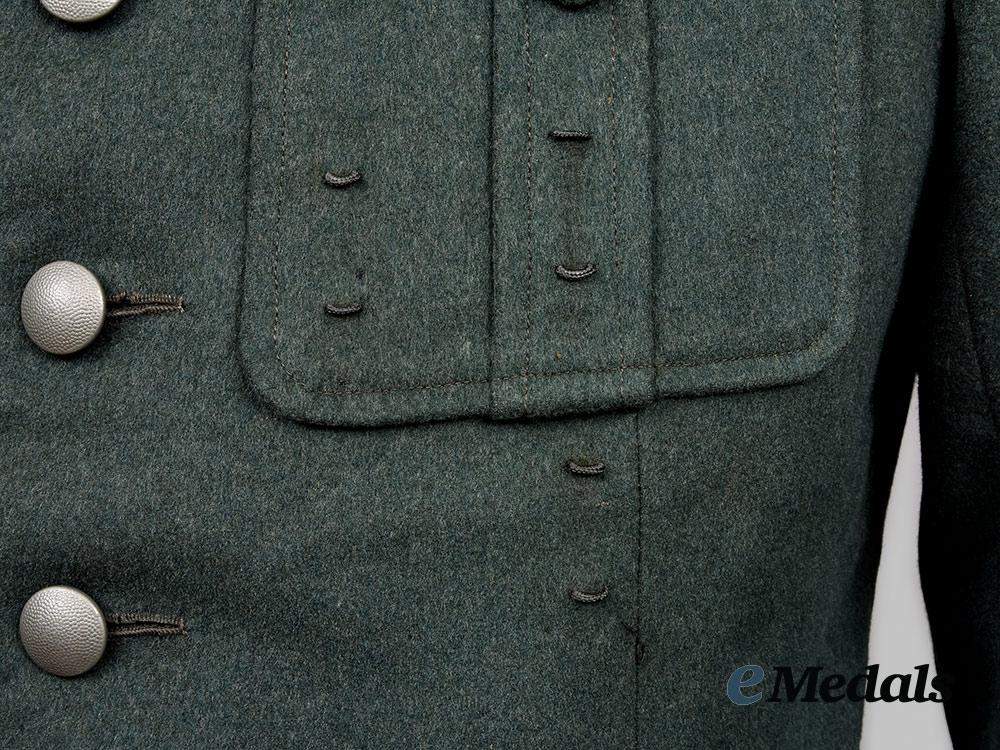
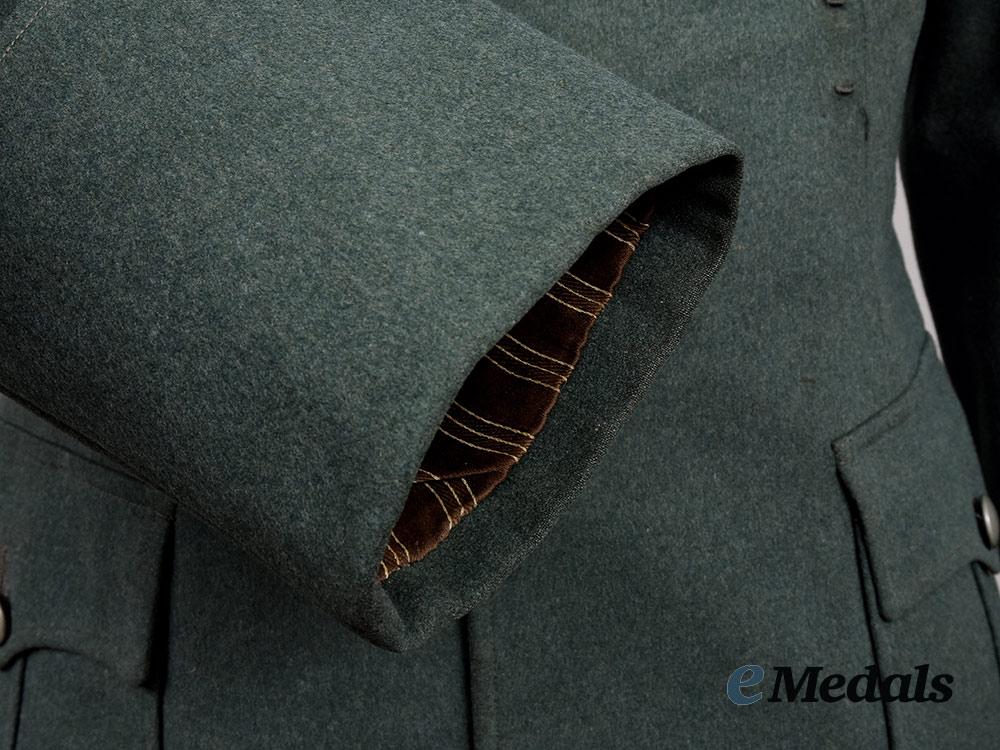
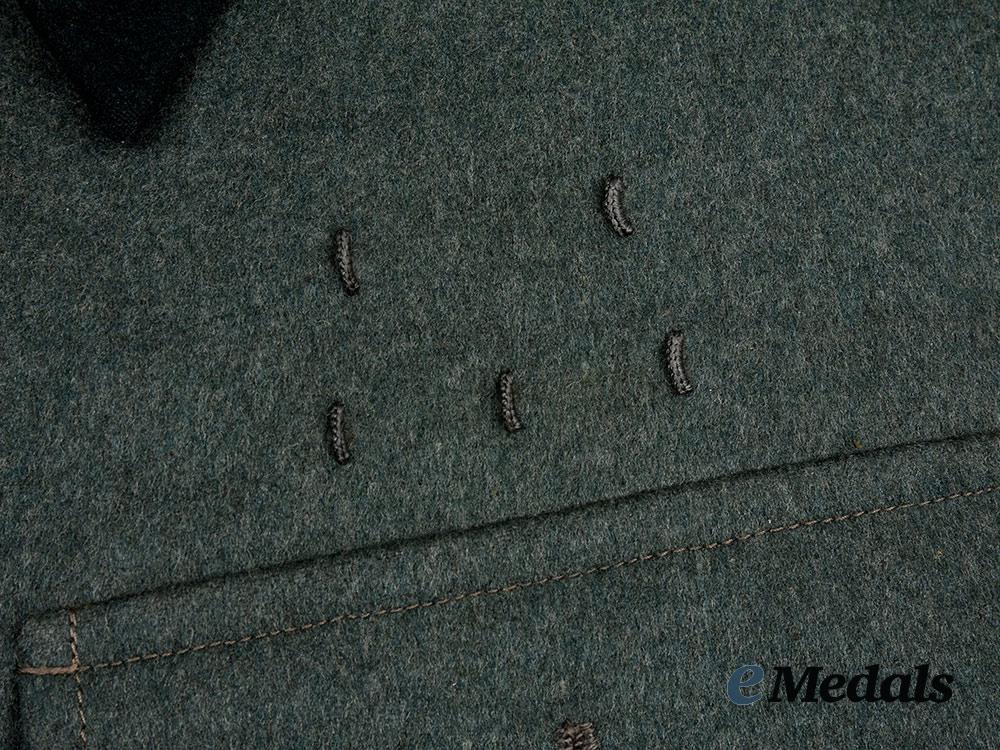
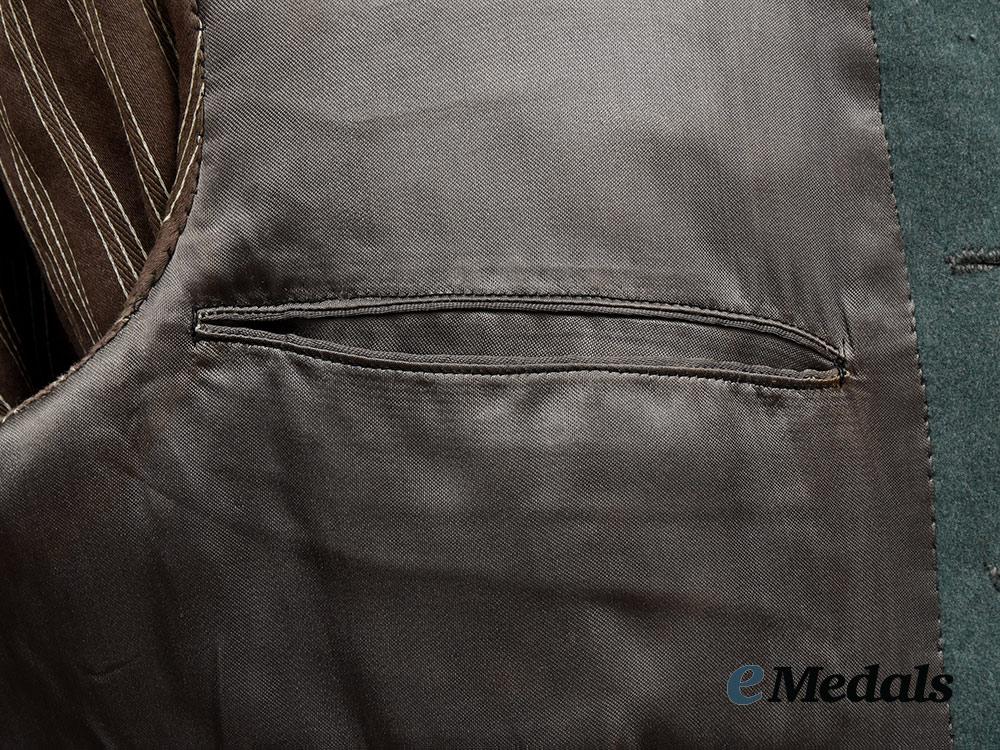
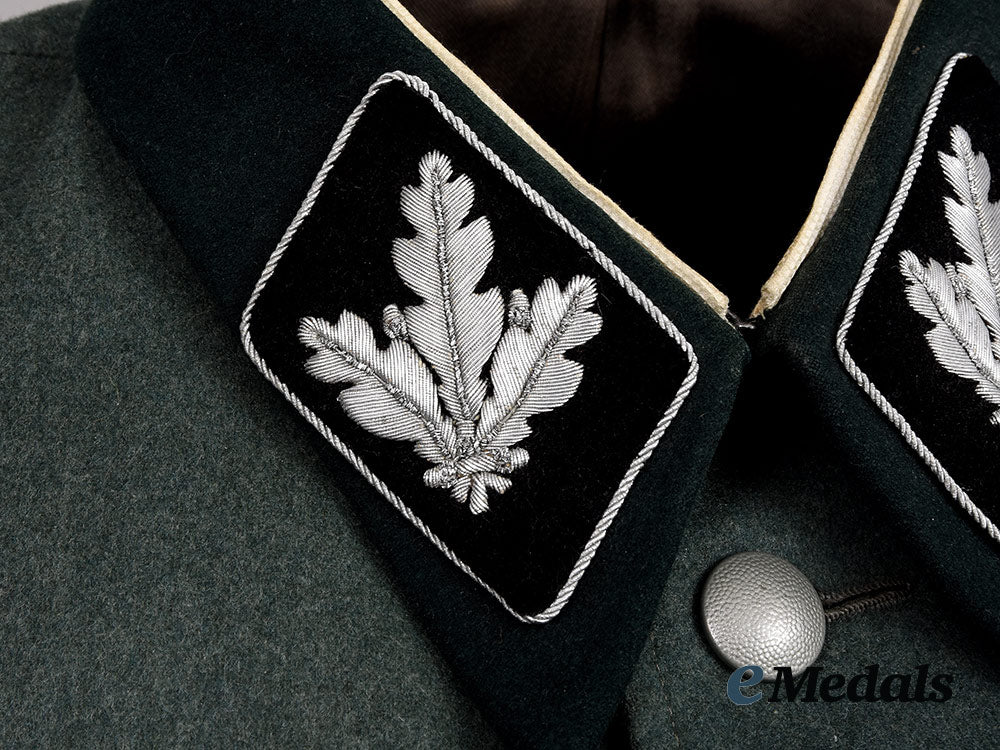
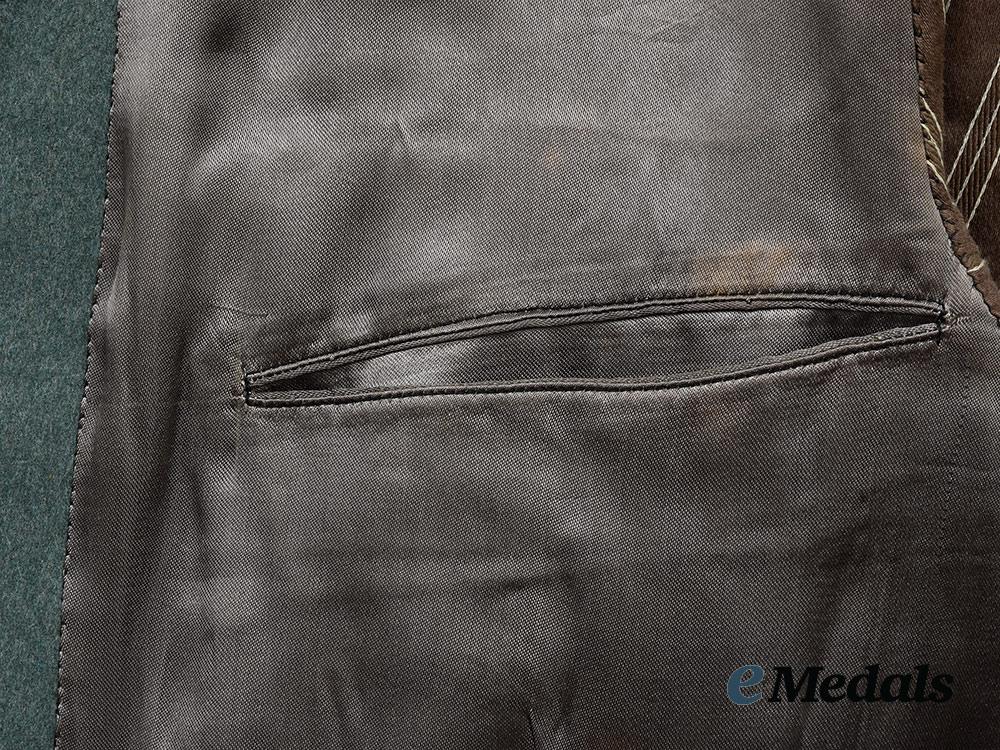
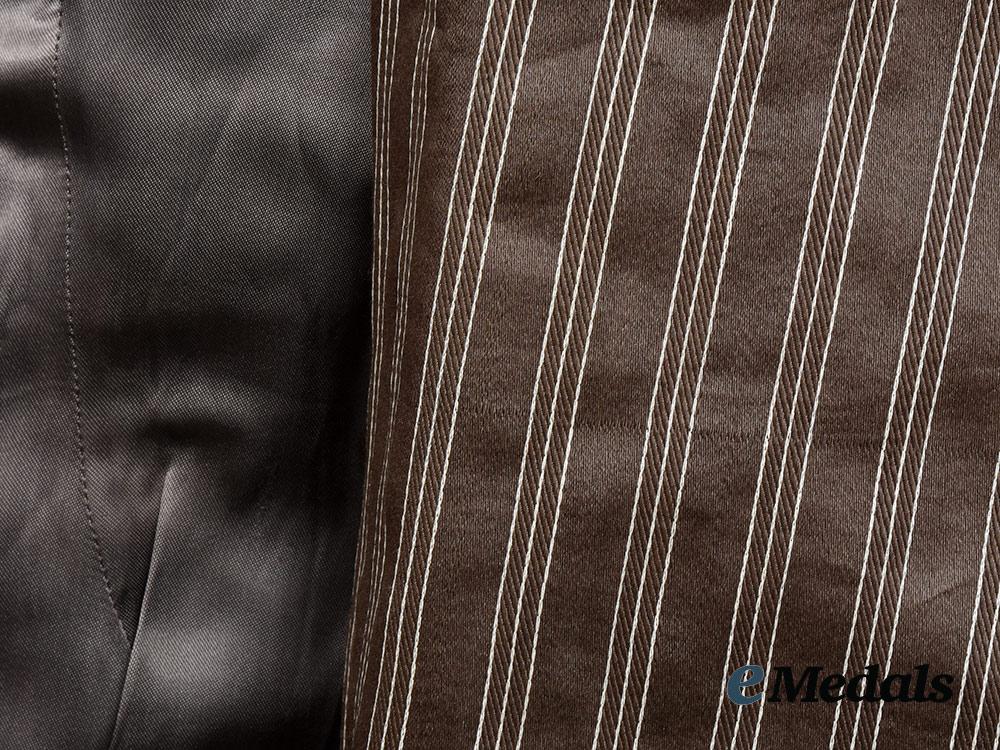
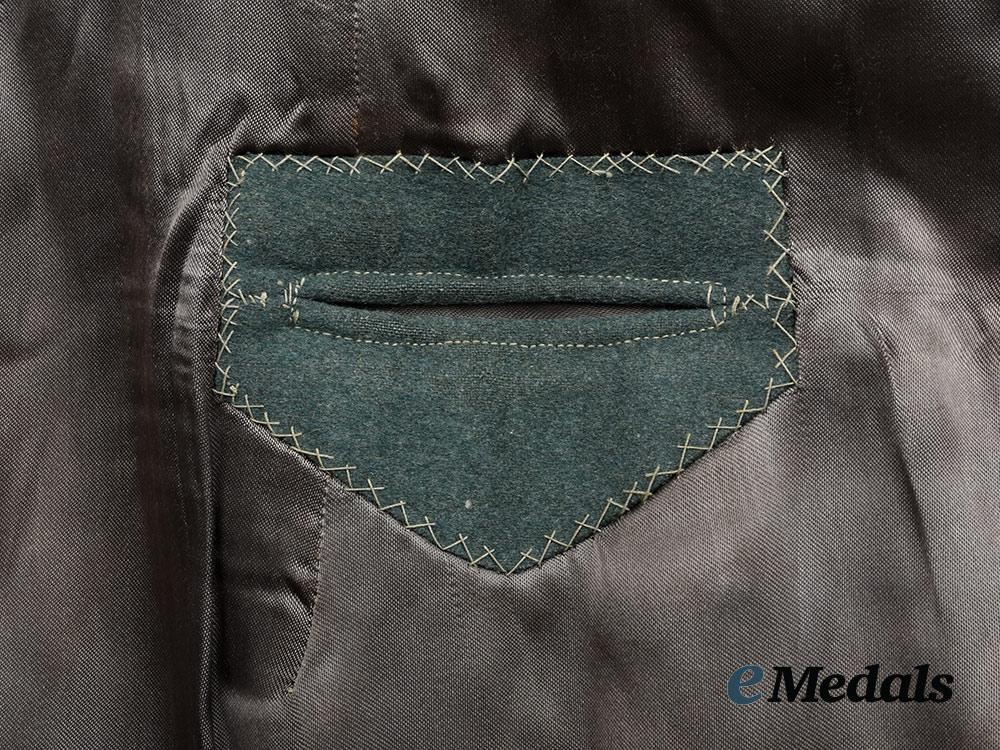
Germany, SS. A Rare And Exceptional Service Tunic Belonging To SS-Brigadeführer Sylvester Stadler
Germany, SS. A Rare And Exceptional Service Tunic Belonging To SS-Brigadeführer Sylvester Stadler
SKU: ITEM: G54220
0% Buyer's Premium
Current Bid:
Your Max Bid:
Bid History:
Time Remaining:
Couldn't load pickup availability
Shipping Details
Shipping Details
eMedals offers rapid domestic and international shipping. Orders received prior to 12:00pm (EST) will be shipped on the same business day.* Orders placed on Canadian Federal holidays will be dispatched the subsequent business day. Courier tracking numbers are provided for all shipments. All items purchased from eMedals can be returned for a full monetary refund or merchandise credit, providing the criteria presented in our Terms & Conditions are met. *Please note that the addition of a COA may impact dispatch time.
Shipping Details
eMedals offers rapid domestic and international shipping. Orders received prior to 12:00pm (EST) will be shipped on the same business day.* Orders placed on Canadian Federal holidays will be dispatched the subsequent business day. Courier tracking numbers are provided for all shipments. All items purchased from eMedals can be returned for a full monetary refund or merchandise credit, providing the criteria presented in our Terms & Conditions are met. *Please note that the addition of a COA may impact dispatch time.
Description
Description
(Waffen-SS Waffenrock für Brigadeführer). A rare and exceptional service tunic belonging to SS-Brigadeführer Sylvester Stadler, a career Waffen-SS Officer who rose to become commander of the 9th SS Panzer Division Hohenstaufen. It is constructed of a fine quality field-grey wool and features a turned-down collar fully lined on the obverse with smooth dark green wool. The collar is flanked by matching collar tabs constructed of black doeskin, trimmed with twisted and rolled silver aluminum wire piping, and bearing three silver aluminum wire oak leaves in the pattern used from 1942 until the end of the war. Each tab measures 45 mm (w) x 60 mm (l) overall. The shoulders are flanked by matching boards constructed of grey wool with card stock cores reinforced with magnetic metal wire reinforcements. The boards are topped by a single band of silver aluminum wire piping interwoven with dual bands of gold bullion wire piping. Each measuring 45 mm (w) x 110 mm (l), the boards are secured in place with machine stitching at the outer edge and with pebbled buttons on the inner edge. Stitched onto the upper left shoulder is an insignia consisting of a black wool backer bearing a carefully hand-embroidered silver aluminum wire SS-style German national eagle clutching a wreathed mobile swastika, measuring 90 mm (w) x 40 mm (h). The cuff of each sleeve is rolled up to a depth of 15 cm and secured in place with two pieces of heavy machine stitching. Each breast flap has two pleated pockets, all closing with scalloped flaps perforated with reinforced buttonholes, in turn meeting pebbled magnetic metal buttons. The upper left pocket is overlaid by three sets of vertically-arranged threaded loops for the accommodation of decorations with a horizontal pinback, while the same pocket is topped by two sets of horizontally-arranged loops, with one set permitting attachment of Stadler’s Close Combat Clasp. The tunic closes with six pebbled magnetic metal buttons on the left flap meeting an equal number of reinforced buttonholes on the left flap. The interior is fully encompassed by a multi-piece rayon liner, with the torse presenting in a slate-grey, in turn transitioning to a dark pinstripe design through the arms. Pockets opening with reinforced horizontal flaps are set into both of the upper breasts. An additional reinforced slit on the left side accommodates the attachment of a dagger. Three butterfly clips set into the interior of the collar allow for the inclusion of a stay, while the upper edge of the collar features a white cotton sweat guard. The tunic is fully unmarked, and measures approximately 44 cm across the shoulders, with an arm length of 59 cm, and an overall body length of 68 cm when folded on a flat surface. Demonstrating only minor signs of age and wear to the material, this rare tunic, never before offered in the collector market, is in an extremely fine condition.
Accompanying the tunic is an extensive lot of correspondence, consisting of 109 handwritten letters compiled by Stadler, with a chronology beginning in the spring of 1942 (when Stadler held command of 2nd Battalion, 4th SS Panzergrenadier Regiment Der Fuhrer, 2nd SS Panzer Division Das Reich), and continuing on until the spring of 1947, as a prisoner of war (POW) in US custody. The majority of the letters are addressed to Stadler’s mother, Helena (née Fuchs), referred to as “Mutterlein”, “Mutterl”, and “Mutti”. Notably, while prohibited by military censors from revealing the precise details of his location, Stadler’s letters open from “Osten” (“East”) and “Westen” (“West”), correctly matching the operational location of the Das Reich Division during the war. A small number of other letters are addressed to recipients named Peter and Harald (possibly brothers or friends). The content of the letters appropriately avoids specific military operational matters, and focuses on family affairs, Stadler’s day-to-day routine, and material needs. The wartime letters then transition to correspondence from his time as a POW following surrender to American forces, with much of Stadler’s time in custody appearing to have been spent in Allendorf (likely Steinlager Allendorf, Stadtallendorf, with other prominent Wehrmacht, SS, and scientific personnel, including Heinz Guderian, Franz Halder, and Hyacinth Graf Strachwitz). The content again focuses on Stadler’s day-to-day life in the camp, with mentions of care packages and family affairs. These conclude upon Stadler’s release from captivity in 1948. This fascinating and researchable primary correspondence documenting the wartime and postwar career of a legendary Waffen-SS commander is in an overall extremely fine condition
Footnote: Sylvester Stadler was born on 30 December 1910 in Fohnsdorf, Austria-Hungary, as the son of a Styrian miner. He joined the SS on 2 May 1933, receiving membership number 139,495, and was consequently stripped of his Austrian citizenship, subsequently absconding to Germany in July. He attended the SS-Junkerschule Bad Tölz from April 1935 until March 1936, receiving a promotion to SS-Untersturmführer upon graduation. Stadler applied for NSDAP membership on 10 June 1937, and was admitted retroactively to 1 June with membership number 4,159,018. During the Second World War, he led an SS-Verfügungstruppe Signals unit and saw combat in France, where he was wounded near Arras. After recovering, Stadler participated in the Balkan campaign and Eastern Front through the end of 1941, and shortly thereafter became an instructor of tactics at the SS-Junkerschule Braunschweig. From the spring of 1942 Stadler commanded a battalion of the 4th SS Panzergrenadier Regiment Der Führer, embedded with 2nd SS Panzer Division Das Reich. It was during this time that he saw further combat on the Eastern Front, receiving the Knight’s Cross of the Iron Cross on 6 April 1943 for repelling a Red Army assault near Kharkov, and received the Oak Leaves on 16 September for further distinction against Soviet forces. After his regiment was decimated on the Eastern Front, Stadler and the wider Das Reich Division was transferred to the Toulouse region of France to recuperate and rebuild. After being ordered north to Normandy to oppose the newly-landed Allies in June 1944, personnel of the 4th SS Panzergrenadier Regiment Der Führer participated in one of the most infamous atrocities against civilians of the Second World War. While on the road to Normandy, the unit razed the town of Oradour-sur-Glane, murdering 642 French civilians in the process. Stadler blamed confusion over partisan activity and held responsible a subordinate, SS-Sturmbannführer Adolf Diekmann, ordering a court martial, but Diekmann was killed in combat before proceedings could begin. On 10 July 1944, Stadler was promoted to commander of 9th SS Panzer Division Hohenstaufen, seeing a whirlwind of action in Normandy, the Low Countries, and the Eastern Front, where he claimed to have received the Swords to his Knight’s Cross by order of Oberstgruppenführer Sepp Dietrich on 22 March 1945, despite there being no documentation nor direct command relation between Stadler and Dietrich. He survived the war and surrendered to US forces in Austria in May 1945. Released from internment in 1948, Stadler retired to private life, but was known to have been a prolific signer of photos to the postwar collector community, and remained active in veteran circles. He died on 23 August 1995 in Königsbrunn, Germany.
Description
(Waffen-SS Waffenrock für Brigadeführer). A rare and exceptional service tunic belonging to SS-Brigadeführer Sylvester Stadler, a career Waffen-SS Officer who rose to become commander of the 9th SS Panzer Division Hohenstaufen. It is constructed of a fine quality field-grey wool and features a turned-down collar fully lined on the obverse with smooth dark green wool. The collar is flanked by matching collar tabs constructed of black doeskin, trimmed with twisted and rolled silver aluminum wire piping, and bearing three silver aluminum wire oak leaves in the pattern used from 1942 until the end of the war. Each tab measures 45 mm (w) x 60 mm (l) overall. The shoulders are flanked by matching boards constructed of grey wool with card stock cores reinforced with magnetic metal wire reinforcements. The boards are topped by a single band of silver aluminum wire piping interwoven with dual bands of gold bullion wire piping. Each measuring 45 mm (w) x 110 mm (l), the boards are secured in place with machine stitching at the outer edge and with pebbled buttons on the inner edge. Stitched onto the upper left shoulder is an insignia consisting of a black wool backer bearing a carefully hand-embroidered silver aluminum wire SS-style German national eagle clutching a wreathed mobile swastika, measuring 90 mm (w) x 40 mm (h). The cuff of each sleeve is rolled up to a depth of 15 cm and secured in place with two pieces of heavy machine stitching. Each breast flap has two pleated pockets, all closing with scalloped flaps perforated with reinforced buttonholes, in turn meeting pebbled magnetic metal buttons. The upper left pocket is overlaid by three sets of vertically-arranged threaded loops for the accommodation of decorations with a horizontal pinback, while the same pocket is topped by two sets of horizontally-arranged loops, with one set permitting attachment of Stadler’s Close Combat Clasp. The tunic closes with six pebbled magnetic metal buttons on the left flap meeting an equal number of reinforced buttonholes on the left flap. The interior is fully encompassed by a multi-piece rayon liner, with the torse presenting in a slate-grey, in turn transitioning to a dark pinstripe design through the arms. Pockets opening with reinforced horizontal flaps are set into both of the upper breasts. An additional reinforced slit on the left side accommodates the attachment of a dagger. Three butterfly clips set into the interior of the collar allow for the inclusion of a stay, while the upper edge of the collar features a white cotton sweat guard. The tunic is fully unmarked, and measures approximately 44 cm across the shoulders, with an arm length of 59 cm, and an overall body length of 68 cm when folded on a flat surface. Demonstrating only minor signs of age and wear to the material, this rare tunic, never before offered in the collector market, is in an extremely fine condition.
Accompanying the tunic is an extensive lot of correspondence, consisting of 109 handwritten letters compiled by Stadler, with a chronology beginning in the spring of 1942 (when Stadler held command of 2nd Battalion, 4th SS Panzergrenadier Regiment Der Fuhrer, 2nd SS Panzer Division Das Reich), and continuing on until the spring of 1947, as a prisoner of war (POW) in US custody. The majority of the letters are addressed to Stadler’s mother, Helena (née Fuchs), referred to as “Mutterlein”, “Mutterl”, and “Mutti”. Notably, while prohibited by military censors from revealing the precise details of his location, Stadler’s letters open from “Osten” (“East”) and “Westen” (“West”), correctly matching the operational location of the Das Reich Division during the war. A small number of other letters are addressed to recipients named Peter and Harald (possibly brothers or friends). The content of the letters appropriately avoids specific military operational matters, and focuses on family affairs, Stadler’s day-to-day routine, and material needs. The wartime letters then transition to correspondence from his time as a POW following surrender to American forces, with much of Stadler’s time in custody appearing to have been spent in Allendorf (likely Steinlager Allendorf, Stadtallendorf, with other prominent Wehrmacht, SS, and scientific personnel, including Heinz Guderian, Franz Halder, and Hyacinth Graf Strachwitz). The content again focuses on Stadler’s day-to-day life in the camp, with mentions of care packages and family affairs. These conclude upon Stadler’s release from captivity in 1948. This fascinating and researchable primary correspondence documenting the wartime and postwar career of a legendary Waffen-SS commander is in an overall extremely fine condition
Footnote: Sylvester Stadler was born on 30 December 1910 in Fohnsdorf, Austria-Hungary, as the son of a Styrian miner. He joined the SS on 2 May 1933, receiving membership number 139,495, and was consequently stripped of his Austrian citizenship, subsequently absconding to Germany in July. He attended the SS-Junkerschule Bad Tölz from April 1935 until March 1936, receiving a promotion to SS-Untersturmführer upon graduation. Stadler applied for NSDAP membership on 10 June 1937, and was admitted retroactively to 1 June with membership number 4,159,018. During the Second World War, he led an SS-Verfügungstruppe Signals unit and saw combat in France, where he was wounded near Arras. After recovering, Stadler participated in the Balkan campaign and Eastern Front through the end of 1941, and shortly thereafter became an instructor of tactics at the SS-Junkerschule Braunschweig. From the spring of 1942 Stadler commanded a battalion of the 4th SS Panzergrenadier Regiment Der Führer, embedded with 2nd SS Panzer Division Das Reich. It was during this time that he saw further combat on the Eastern Front, receiving the Knight’s Cross of the Iron Cross on 6 April 1943 for repelling a Red Army assault near Kharkov, and received the Oak Leaves on 16 September for further distinction against Soviet forces. After his regiment was decimated on the Eastern Front, Stadler and the wider Das Reich Division was transferred to the Toulouse region of France to recuperate and rebuild. After being ordered north to Normandy to oppose the newly-landed Allies in June 1944, personnel of the 4th SS Panzergrenadier Regiment Der Führer participated in one of the most infamous atrocities against civilians of the Second World War. While on the road to Normandy, the unit razed the town of Oradour-sur-Glane, murdering 642 French civilians in the process. Stadler blamed confusion over partisan activity and held responsible a subordinate, SS-Sturmbannführer Adolf Diekmann, ordering a court martial, but Diekmann was killed in combat before proceedings could begin. On 10 July 1944, Stadler was promoted to commander of 9th SS Panzer Division Hohenstaufen, seeing a whirlwind of action in Normandy, the Low Countries, and the Eastern Front, where he claimed to have received the Swords to his Knight’s Cross by order of Oberstgruppenführer Sepp Dietrich on 22 March 1945, despite there being no documentation nor direct command relation between Stadler and Dietrich. He survived the war and surrendered to US forces in Austria in May 1945. Released from internment in 1948, Stadler retired to private life, but was known to have been a prolific signer of photos to the postwar collector community, and remained active in veteran circles. He died on 23 August 1995 in Königsbrunn, Germany.
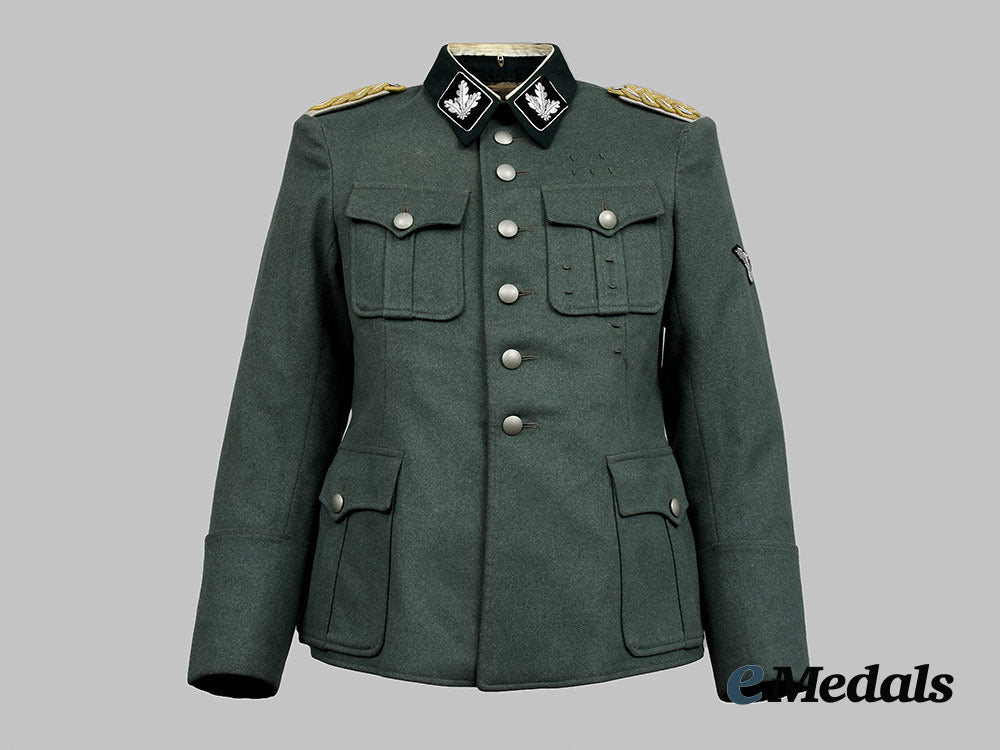

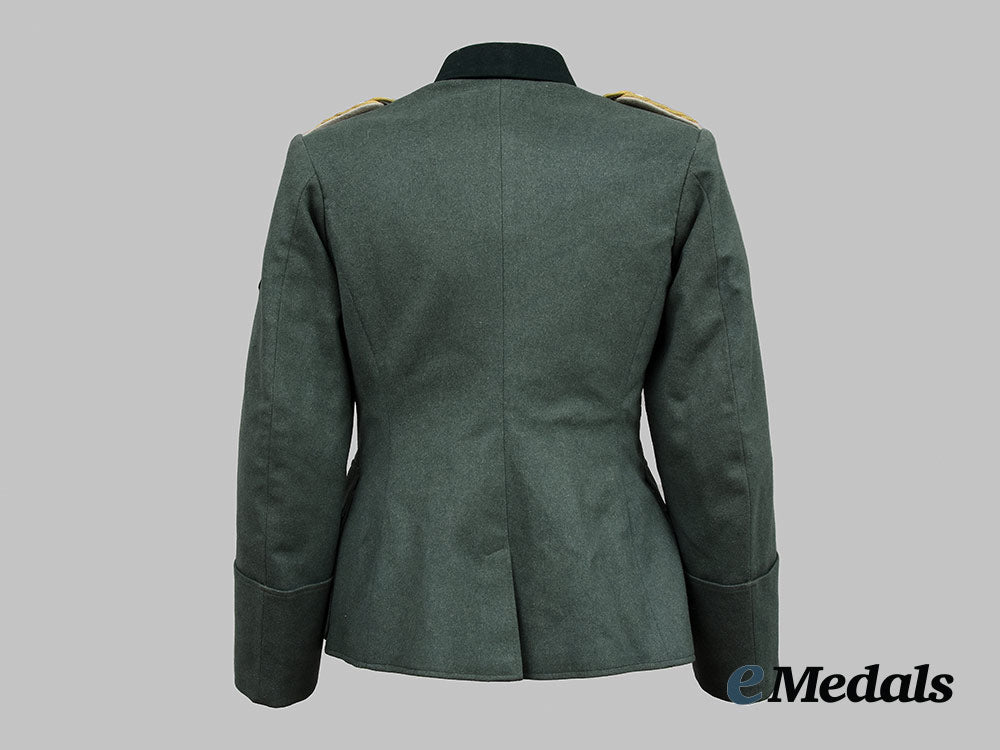
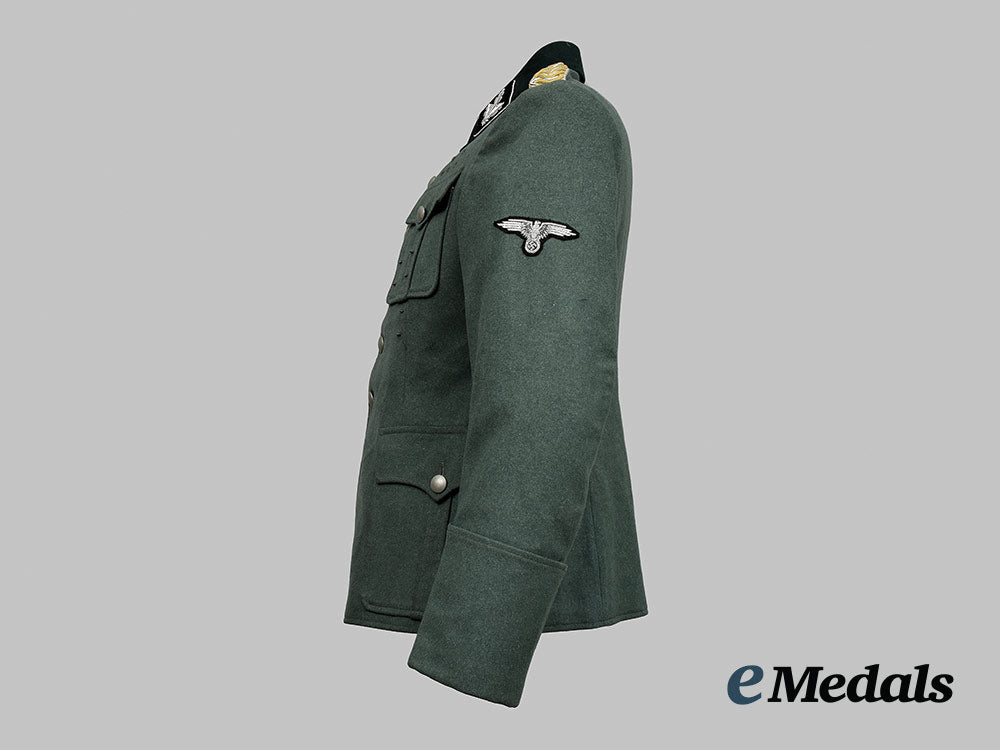
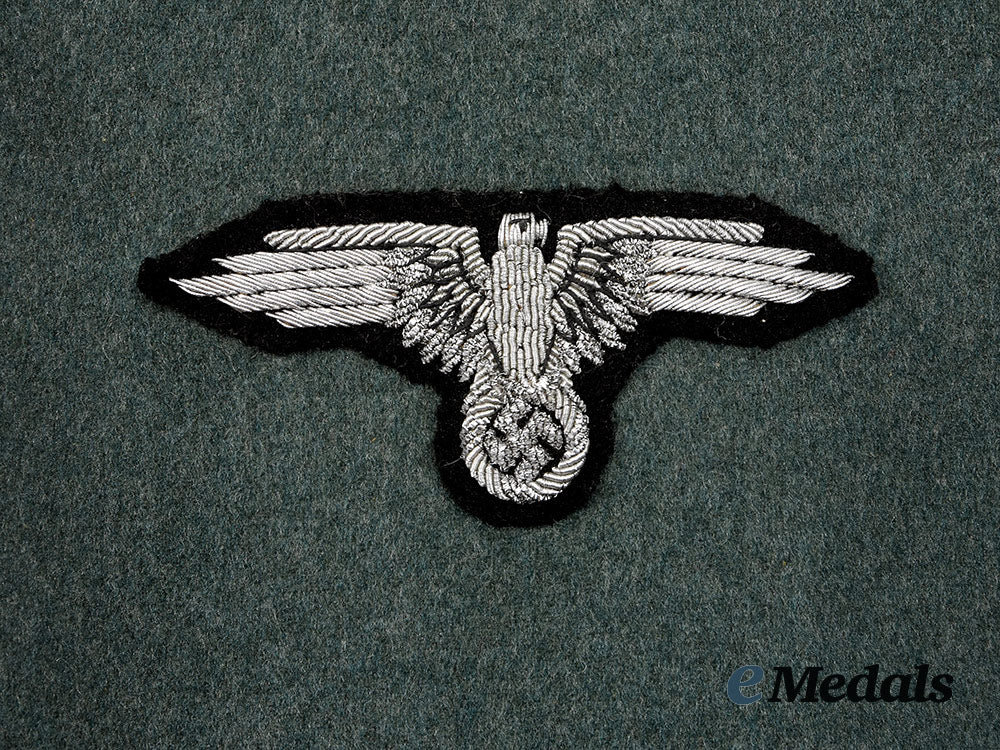
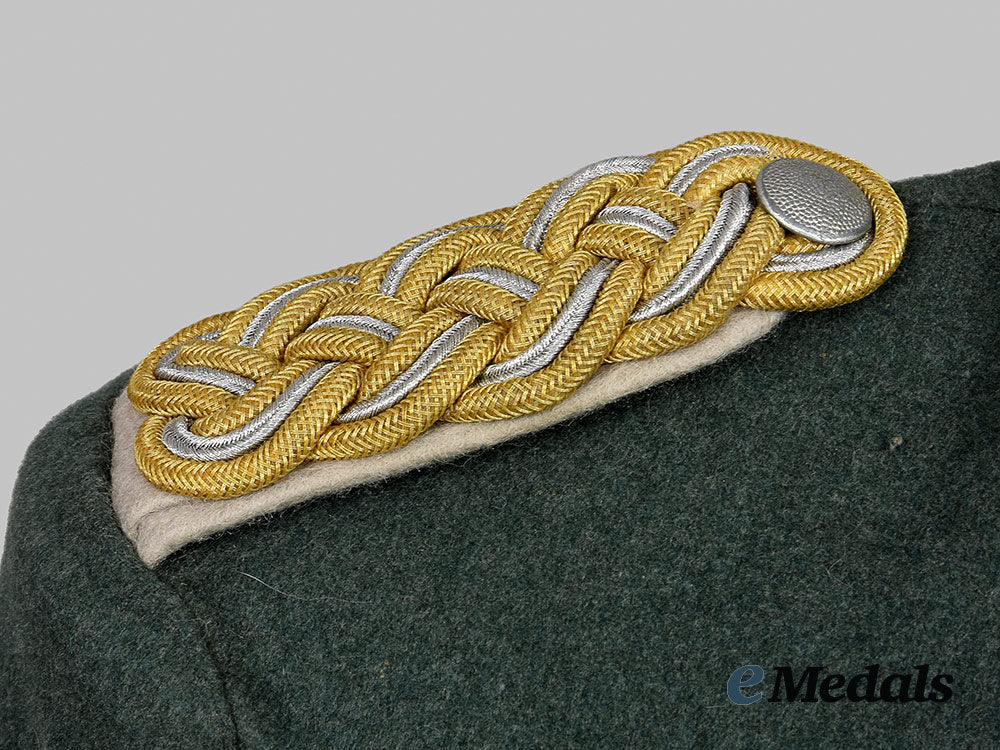
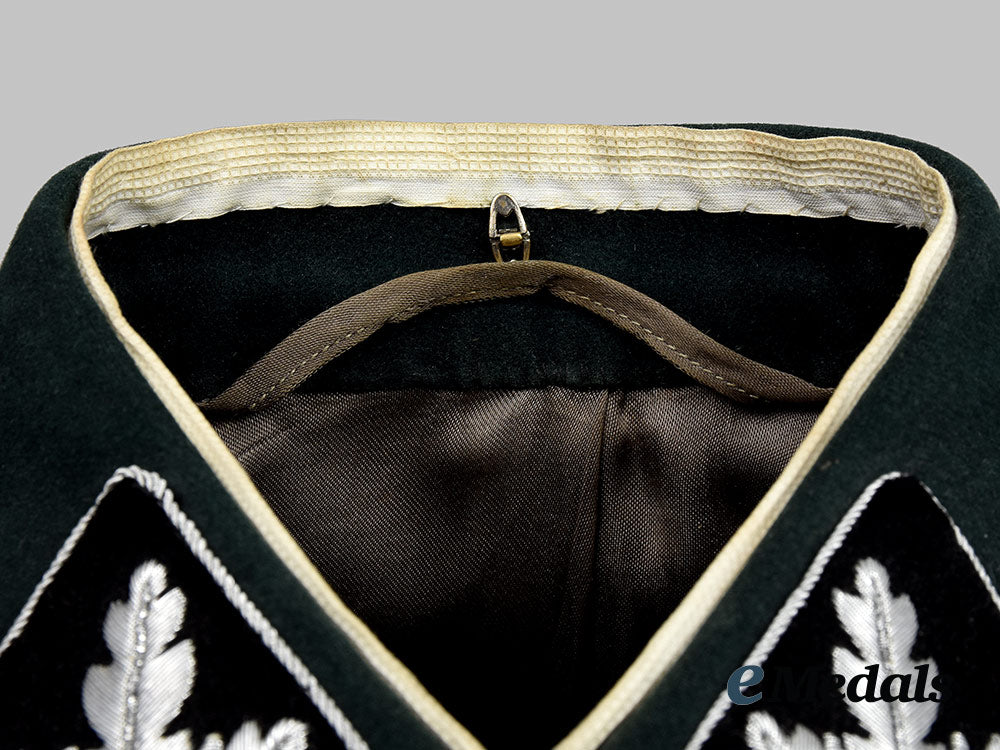
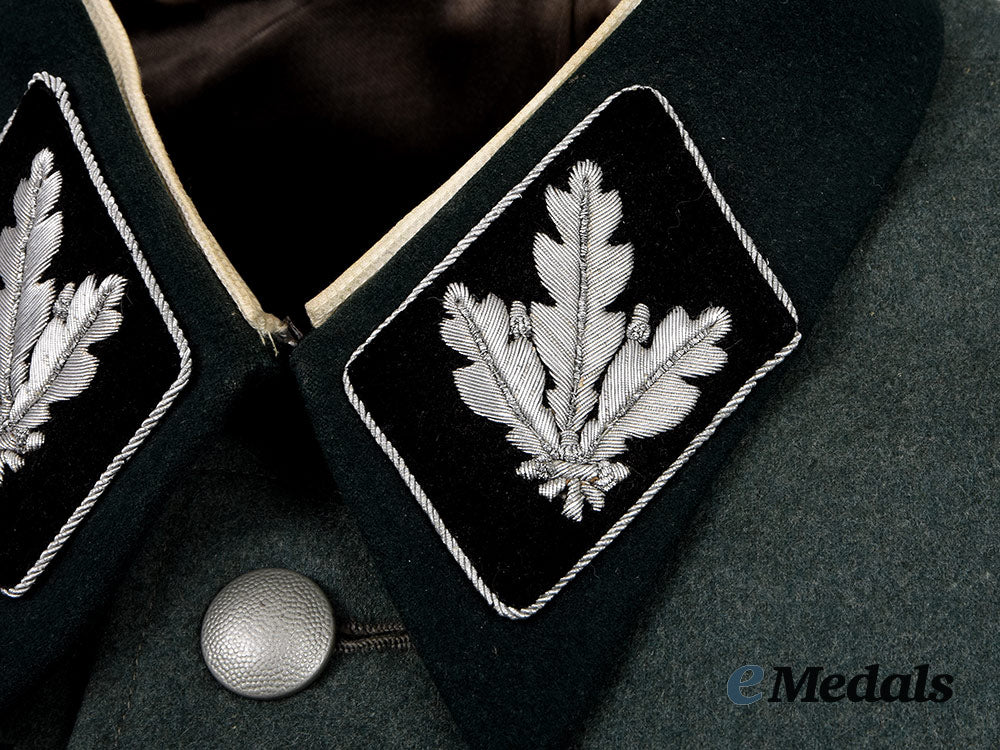

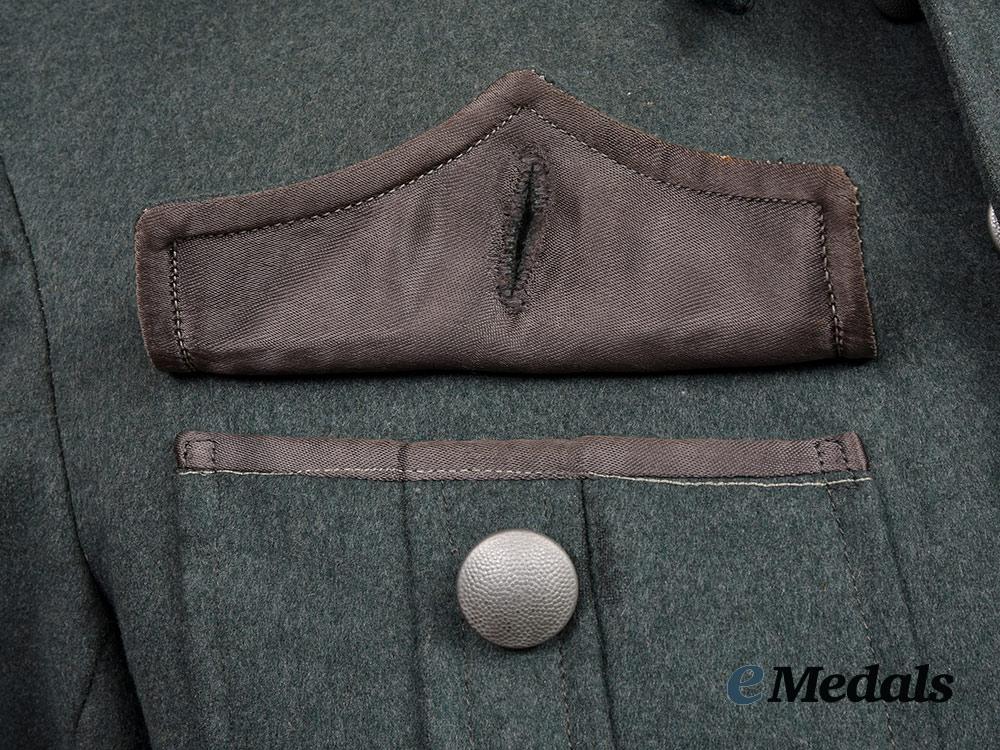
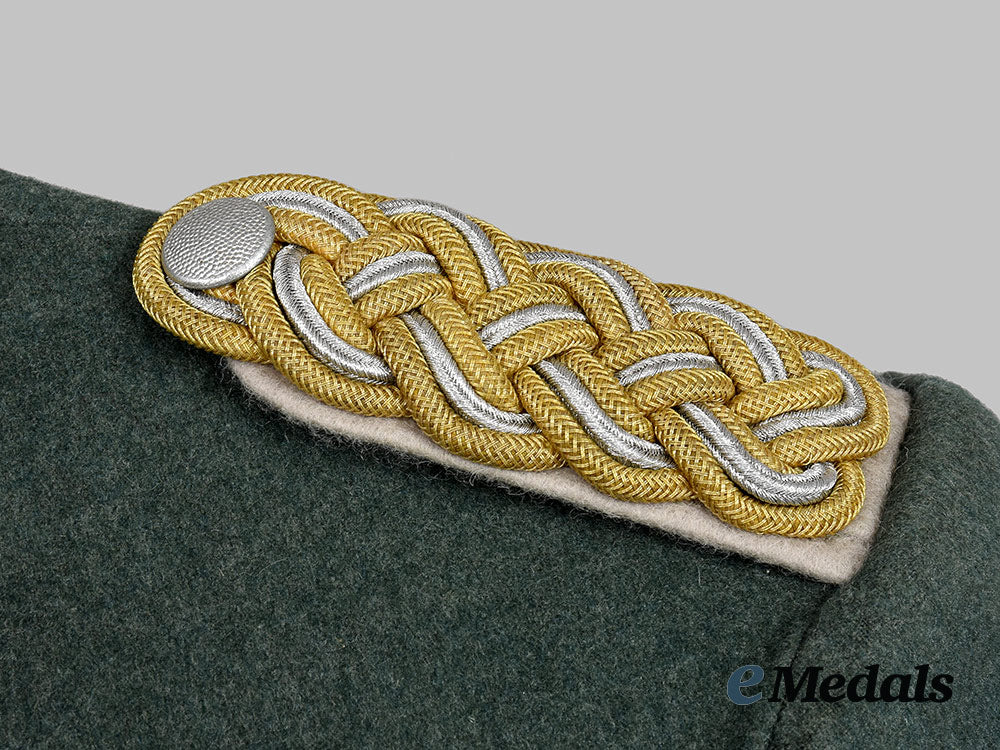
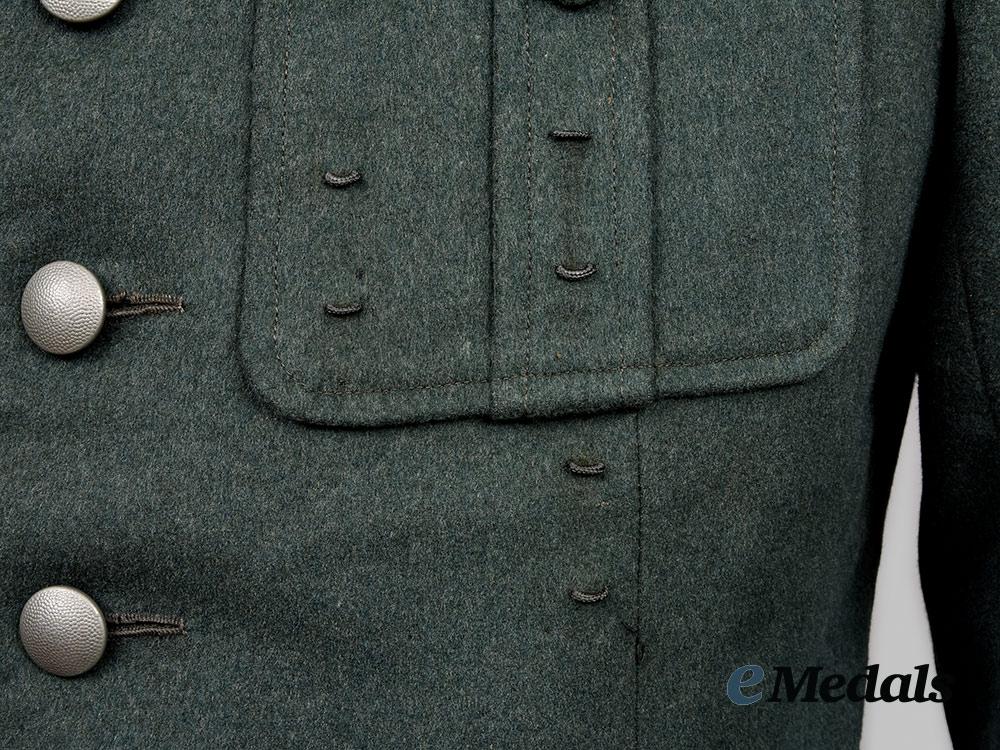
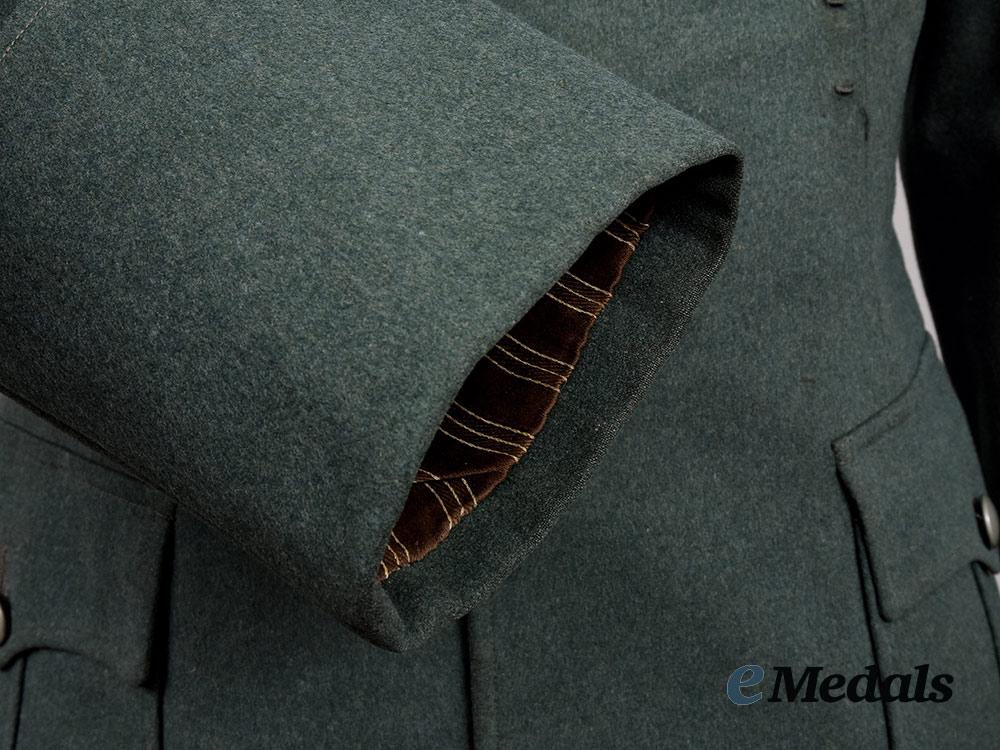
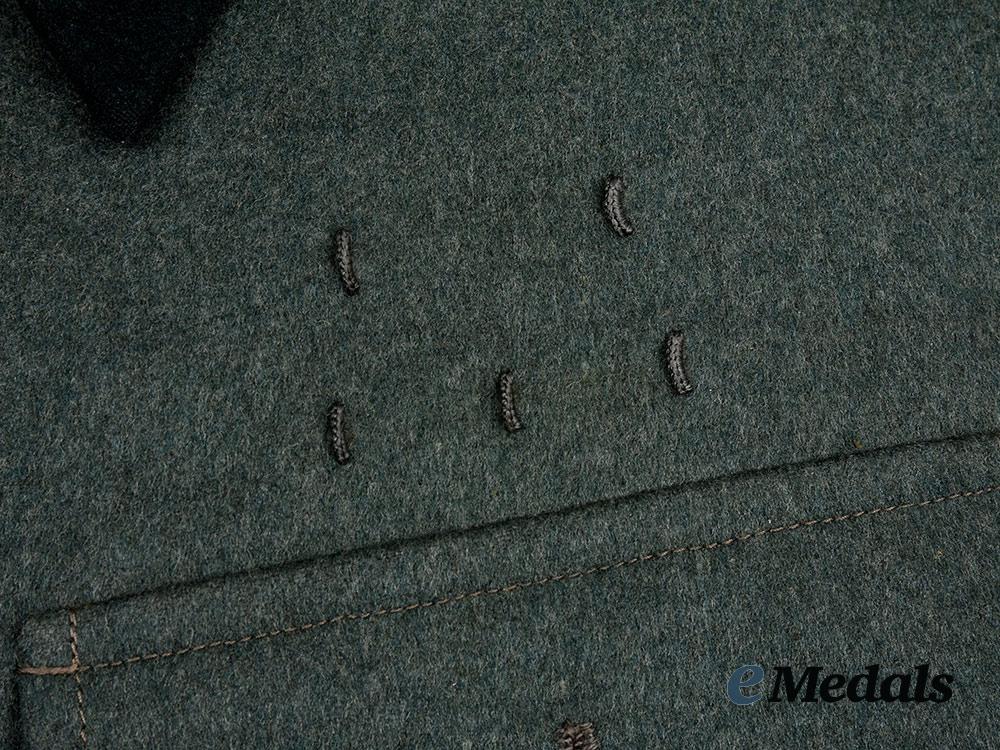
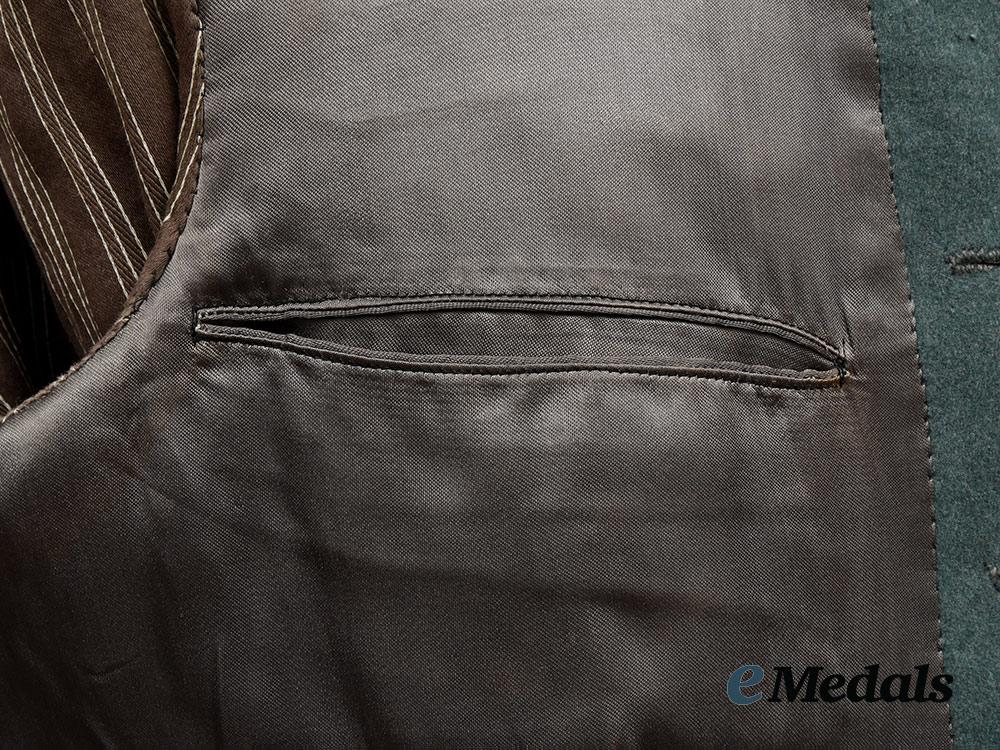
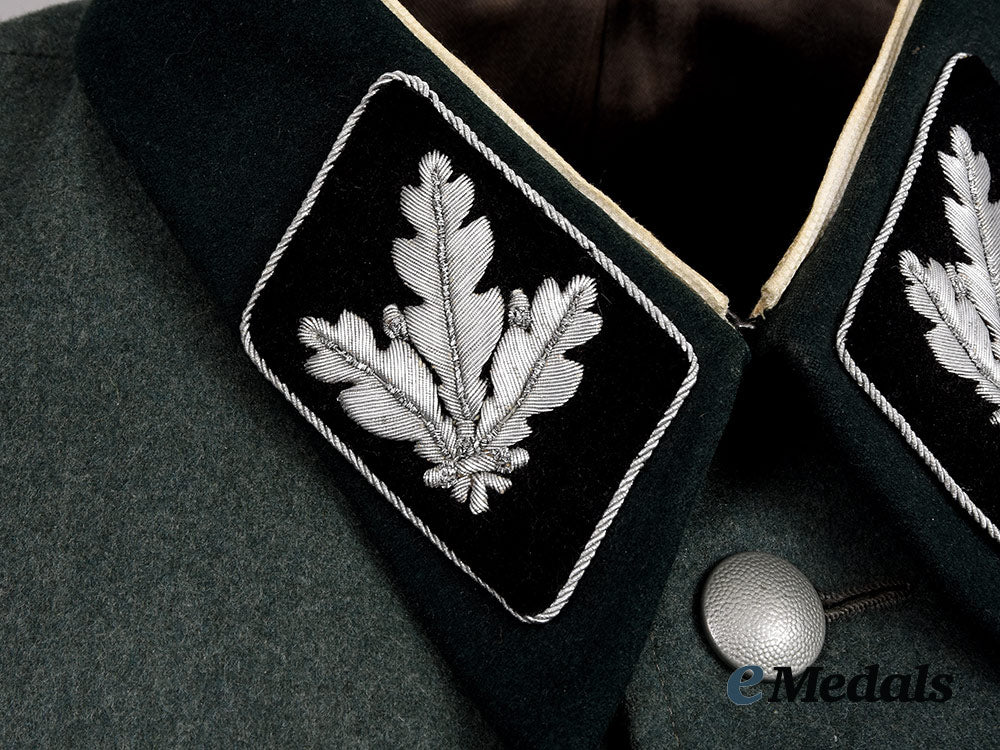
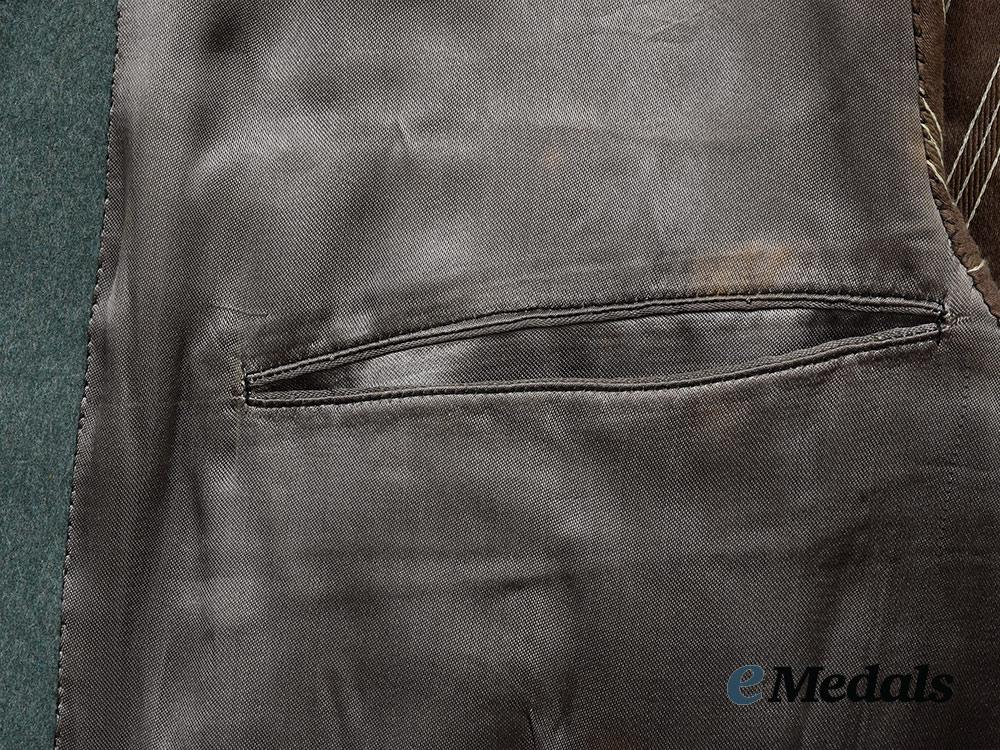
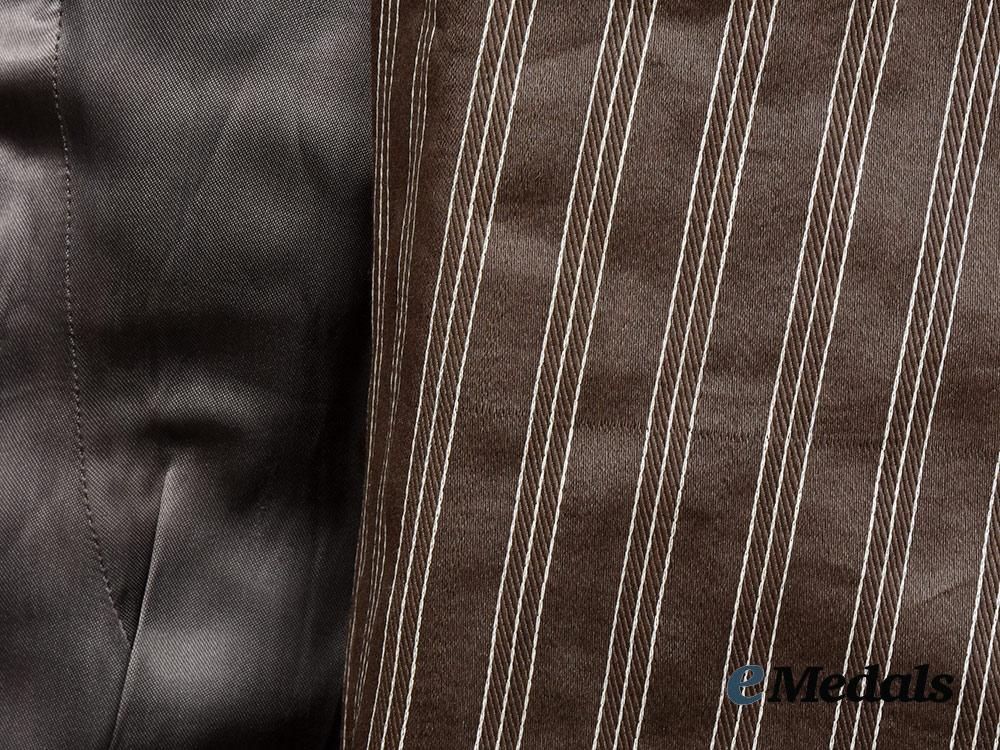
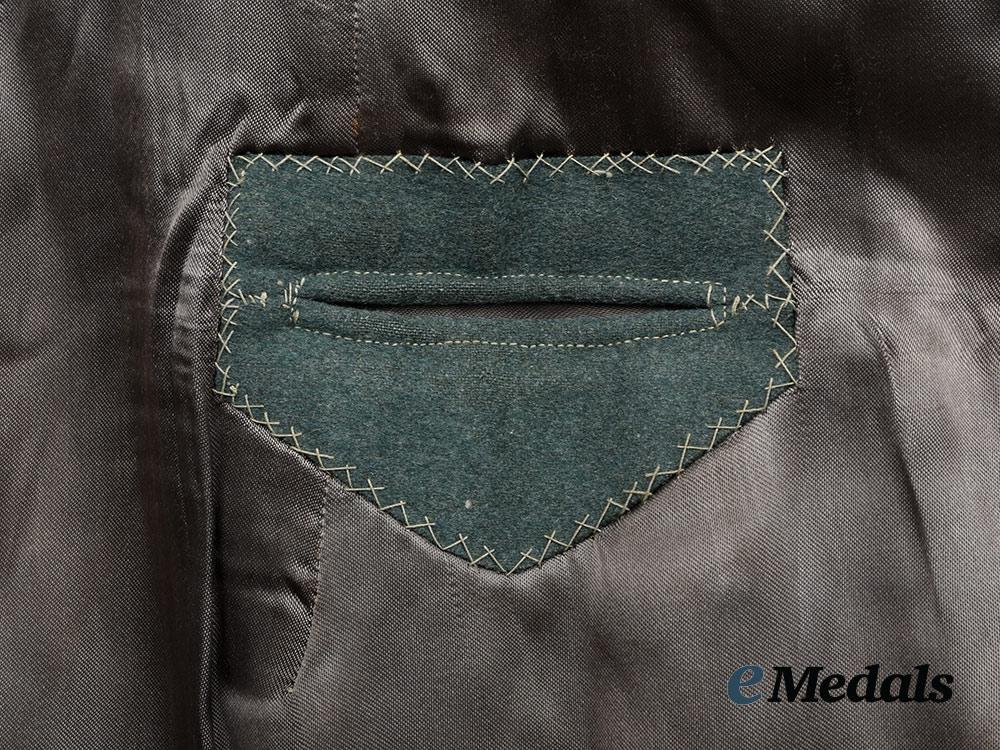
You May Also Like
Japan, Empire. A T90 Civil Defense Helmet, c.1943
W8287
Germany, SA. A Model 1933 Service Dagger, SA-Gruppe Nordsee, by Friedrich von der Kohlen
G59818
Germany, SA. A Model 1933 Service Dagger, SA-Gruppe Pommern, by Gustav Wirth
G59816
Germany, Third Reich. A Mixed Lot of Tyrolean Marksmanship Badges
G52930
Germany, SS. An Estonian Waffen-SS Volunteer’s Sleeve Shield
G50381
-
Japan, Empire. A T90 Civil Defense Helmet, c.1943
W8287
Add to CartRegular price $275 USDRegular price $0 USD Sale price $275 USDUnit price / per -
Germany, SA. A Model 1933 Service Dagger, SA-Gruppe Nordsee, by Friedrich von der Kohlen
G59818
Add to CartRegular price $980 USDRegular price $0 USD Sale price $980 USDUnit price / per -
Germany, SA. A Model 1933 Service Dagger, SA-Gruppe Pommern, by Gustav Wirth
G59816
Add to CartRegular price $980 USDRegular price $0 USD Sale price $980 USDUnit price / per -
Germany, Third Reich. A Mixed Lot of Tyrolean Marksmanship Badges
G52930
Add to CartRegular price $135 USDRegular price $0 USD Sale price $135 USDUnit price / per -
Germany, SS. An Estonian Waffen-SS Volunteer’s Sleeve Shield
G50381
Add to CartRegular price $150 USDRegular price $0 USD Sale price $150 USDUnit price / per
Do you have a similar item you are interested in selling?
Please complete the form and our client care representatives will contact you.
Sell Item